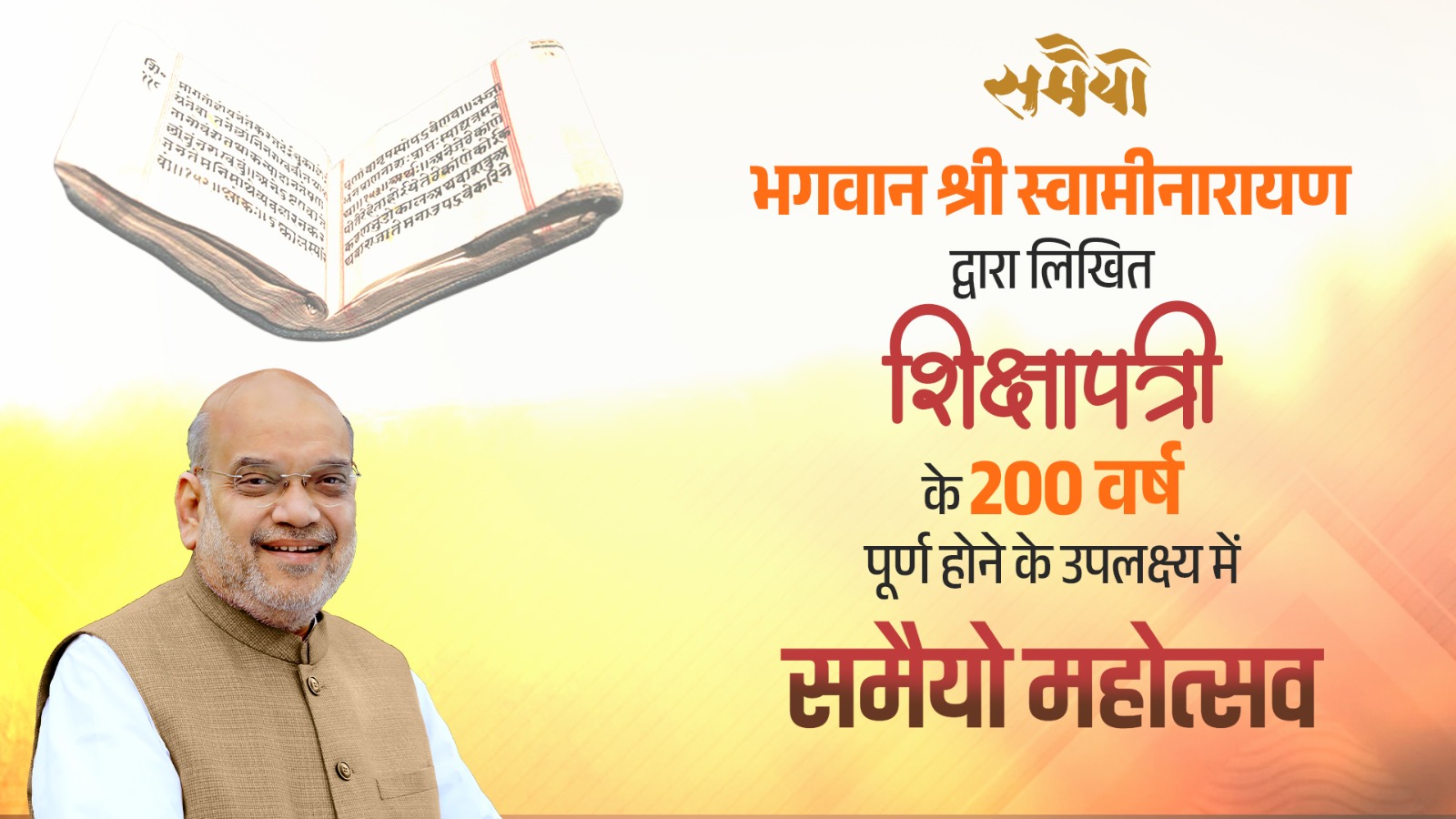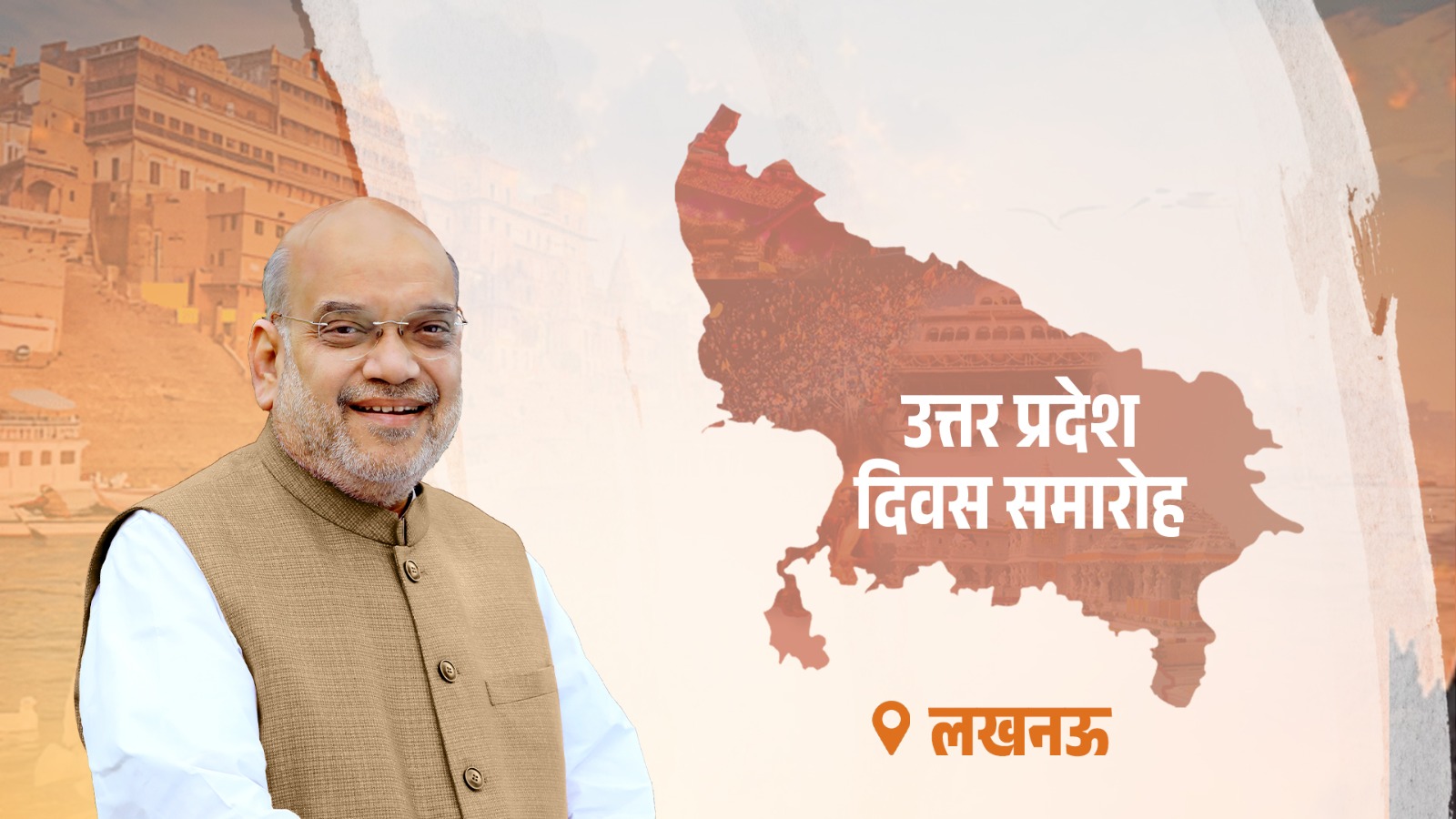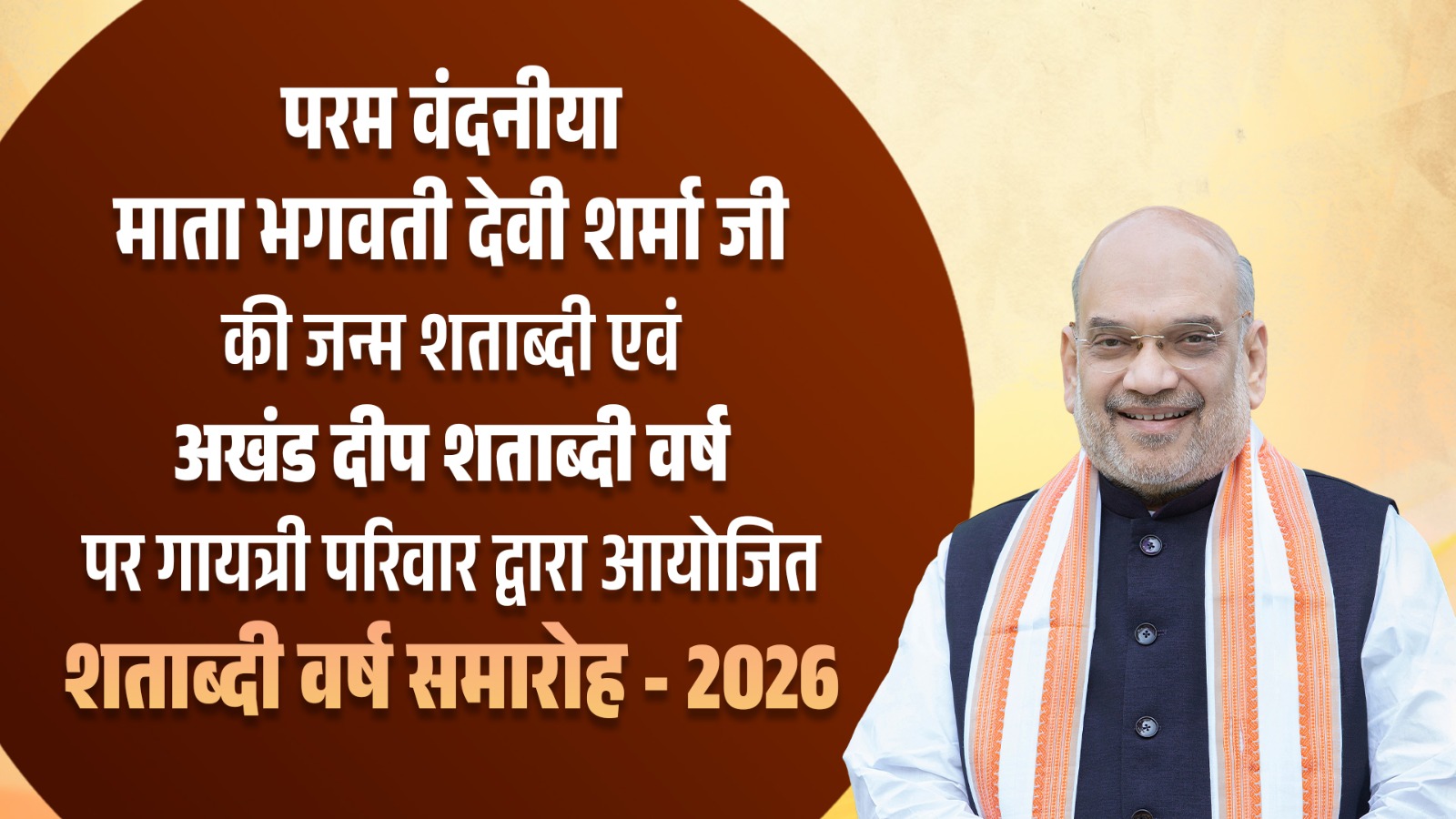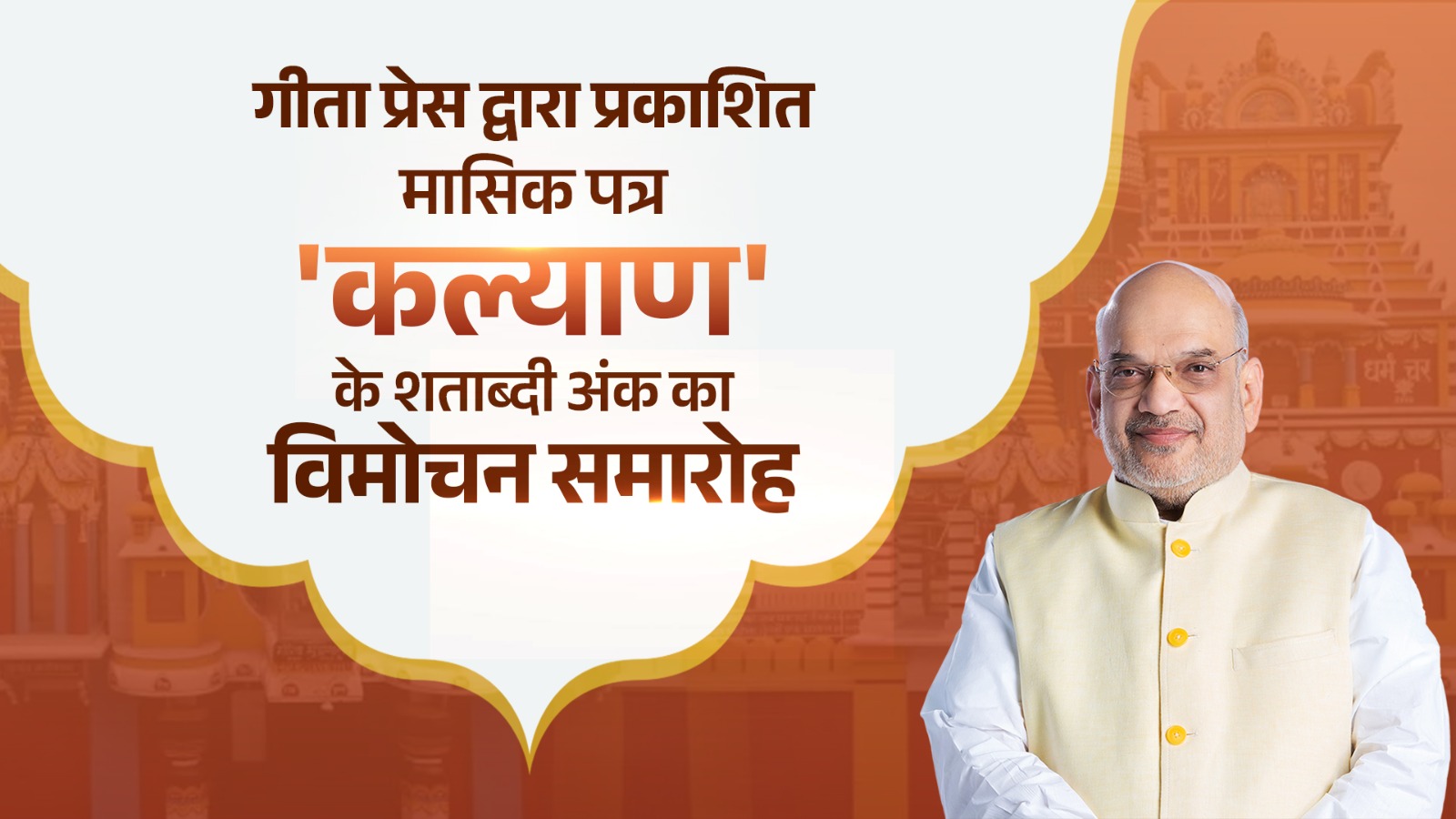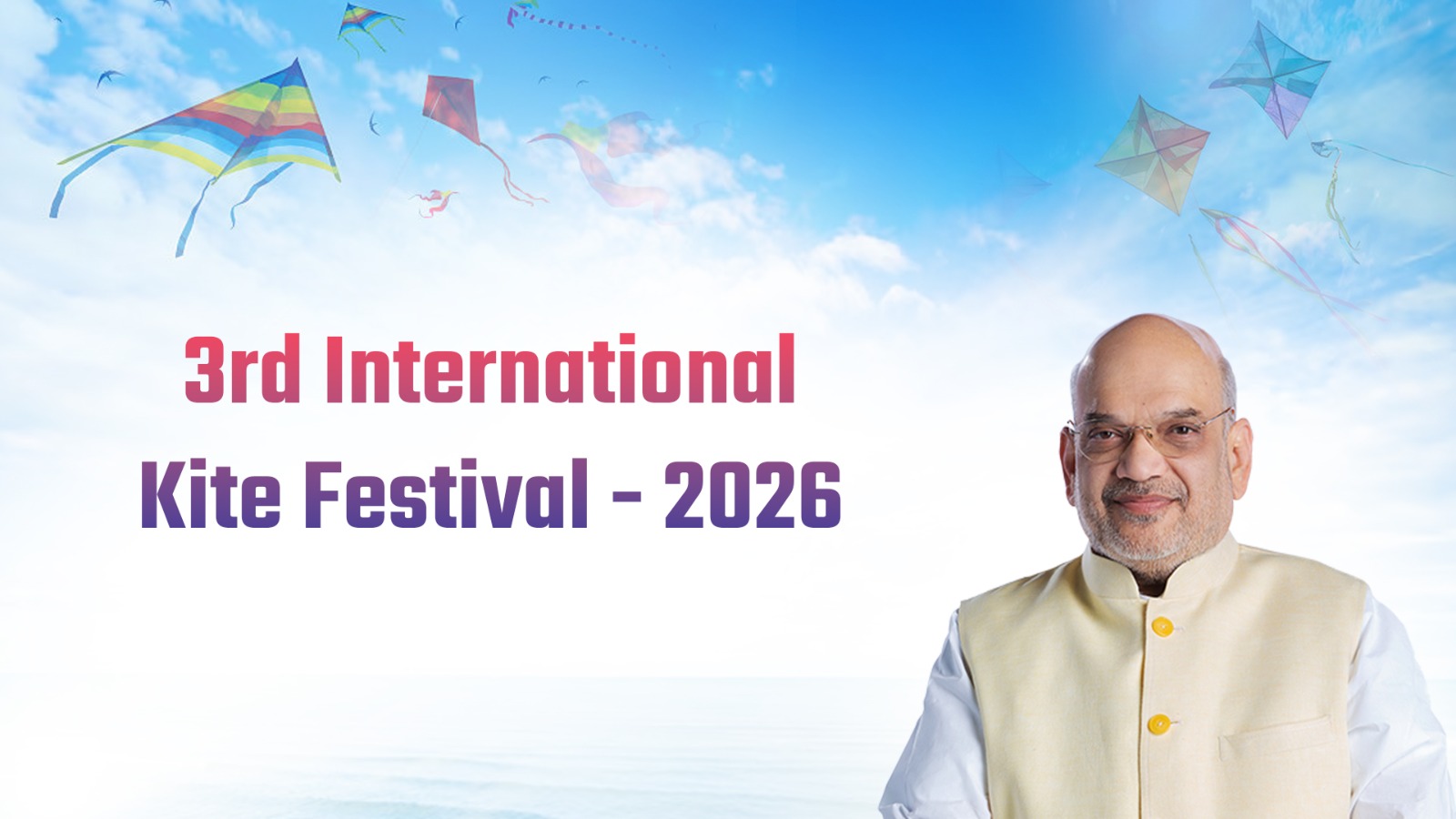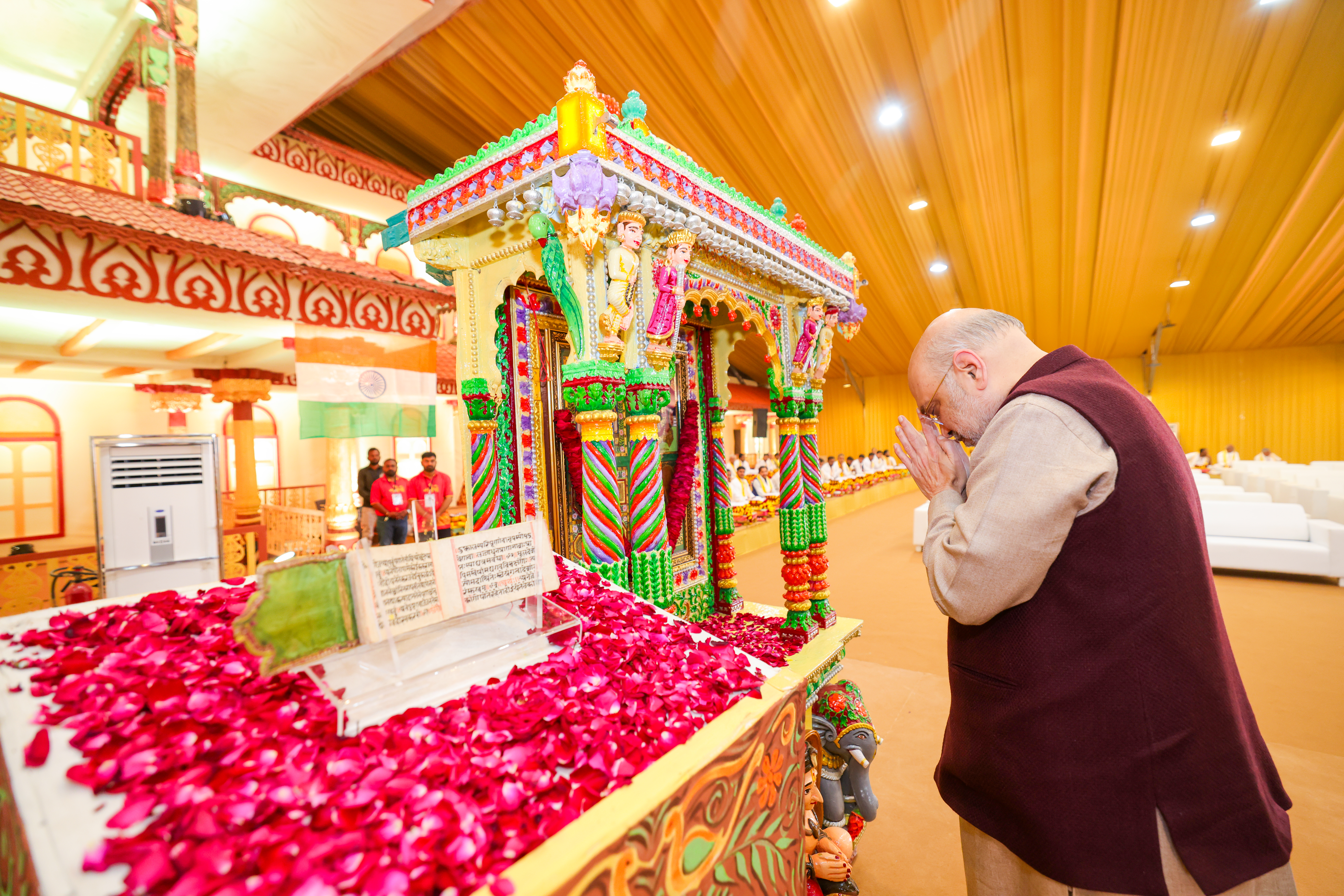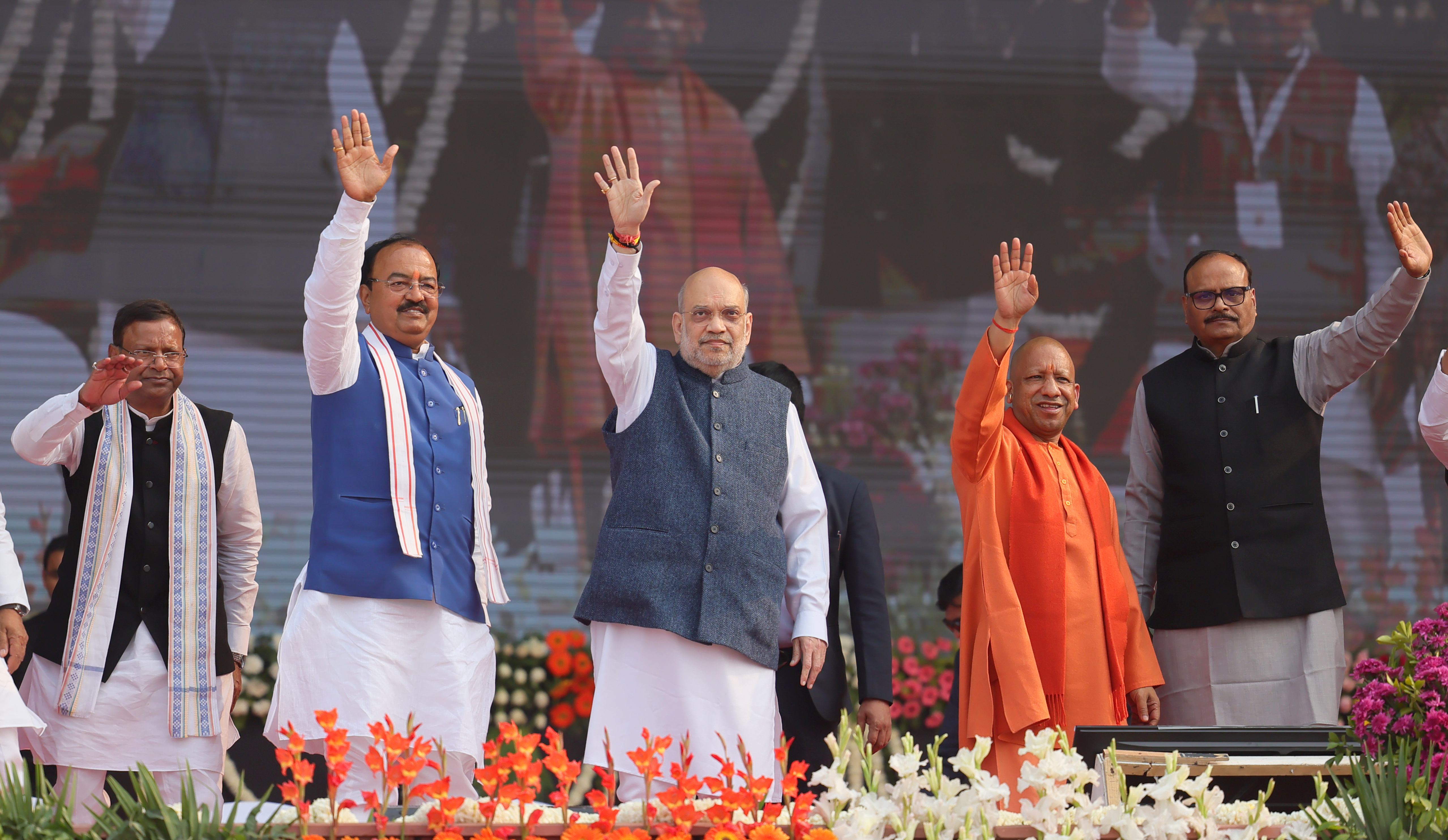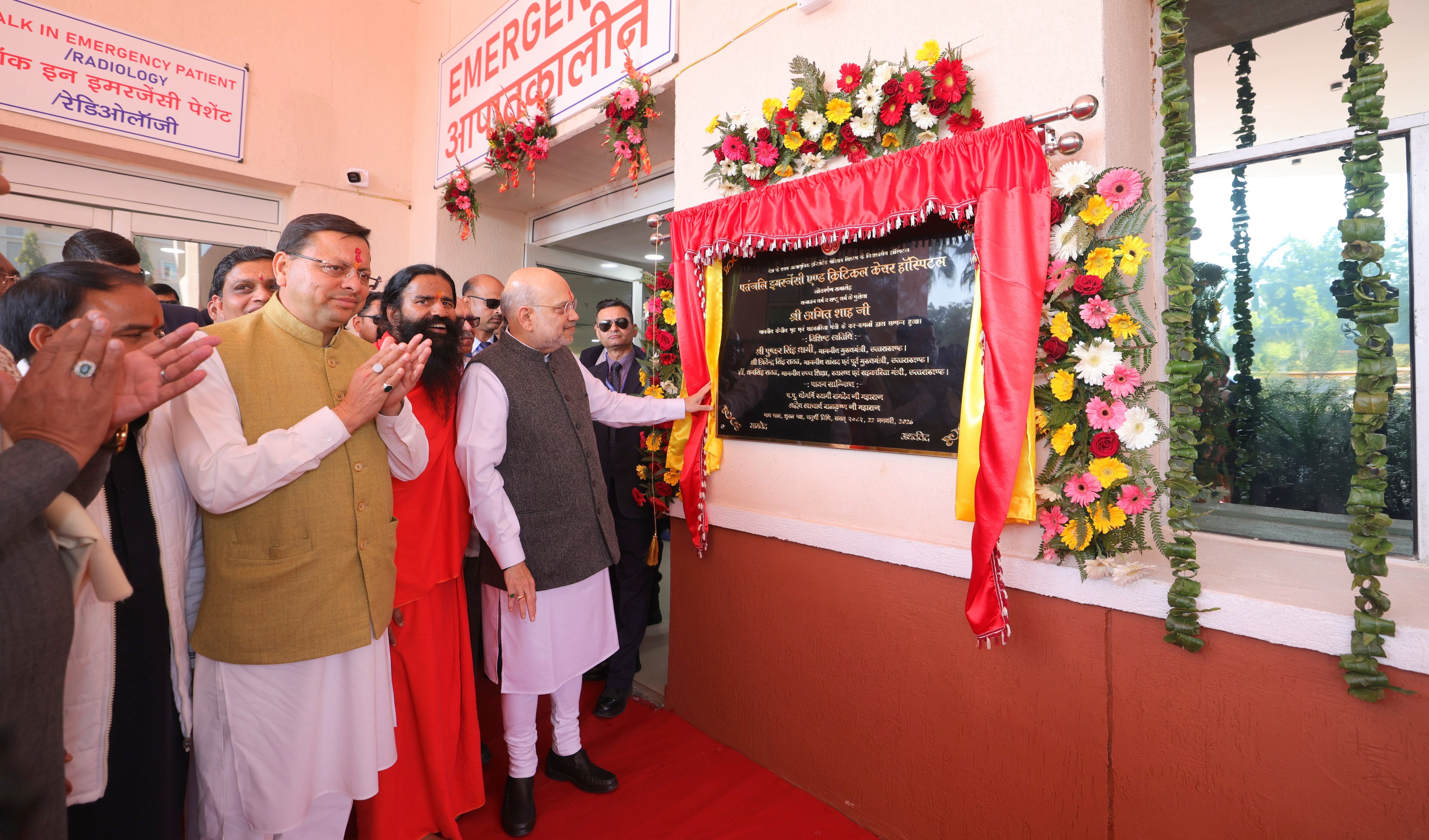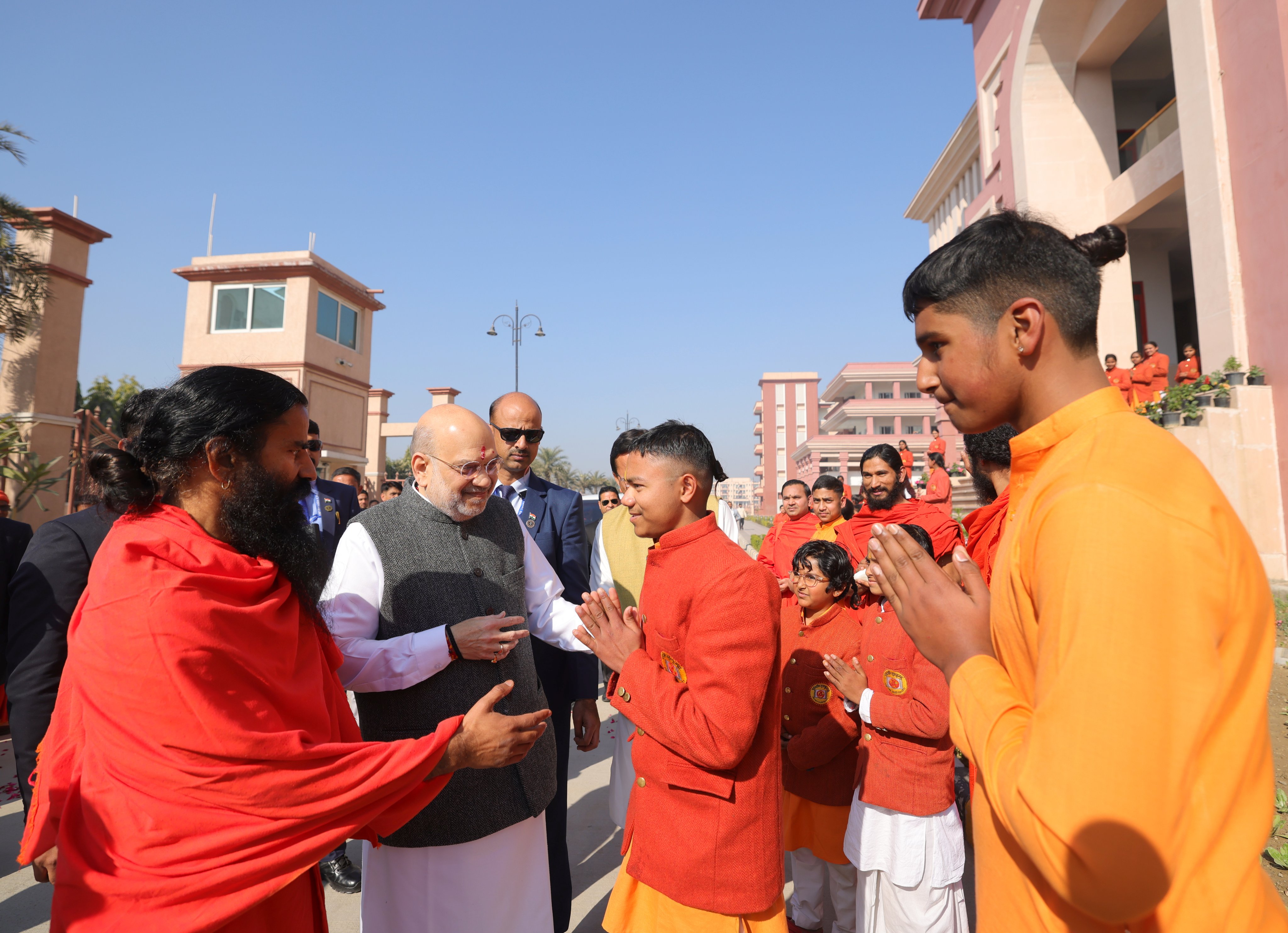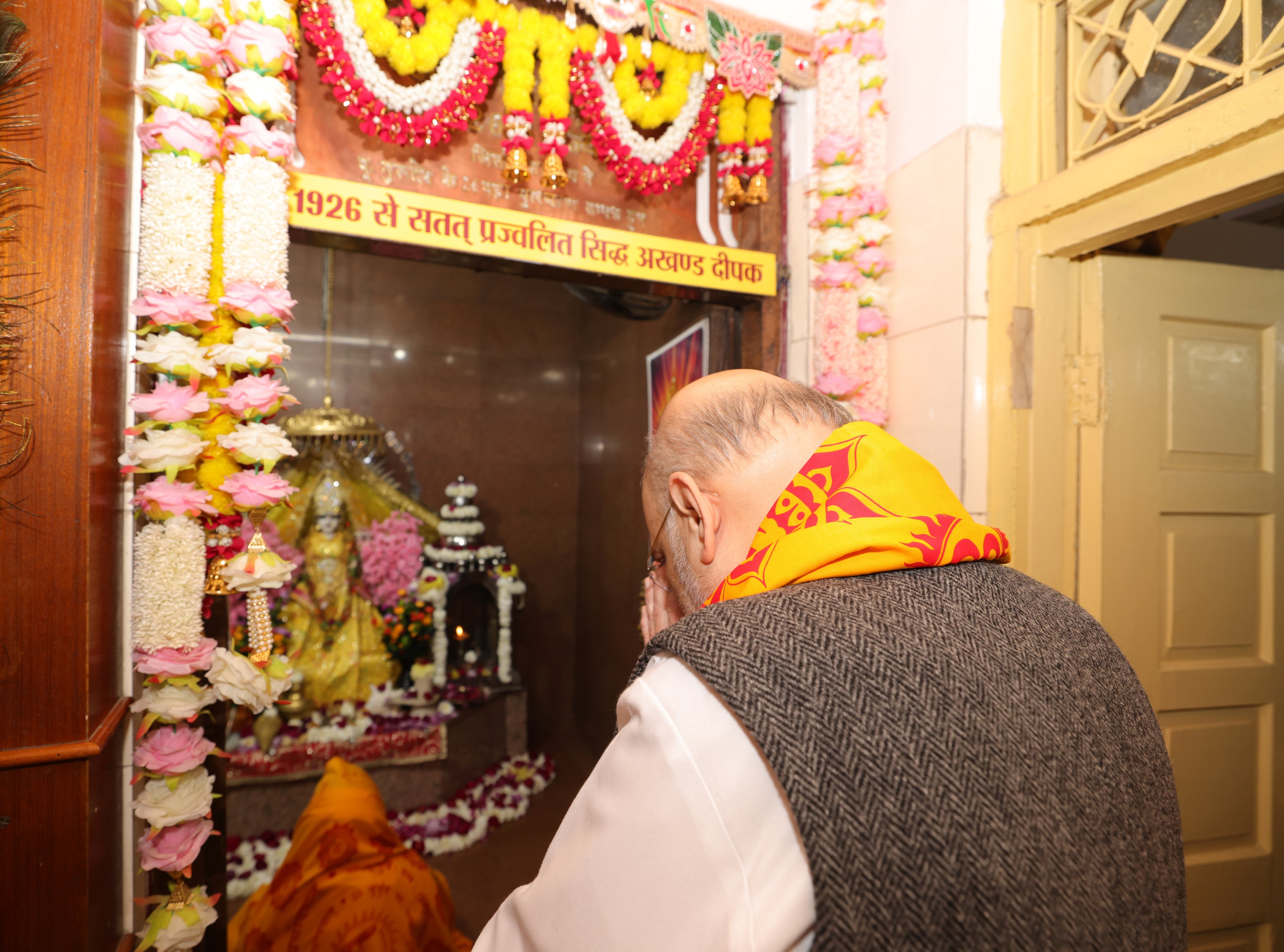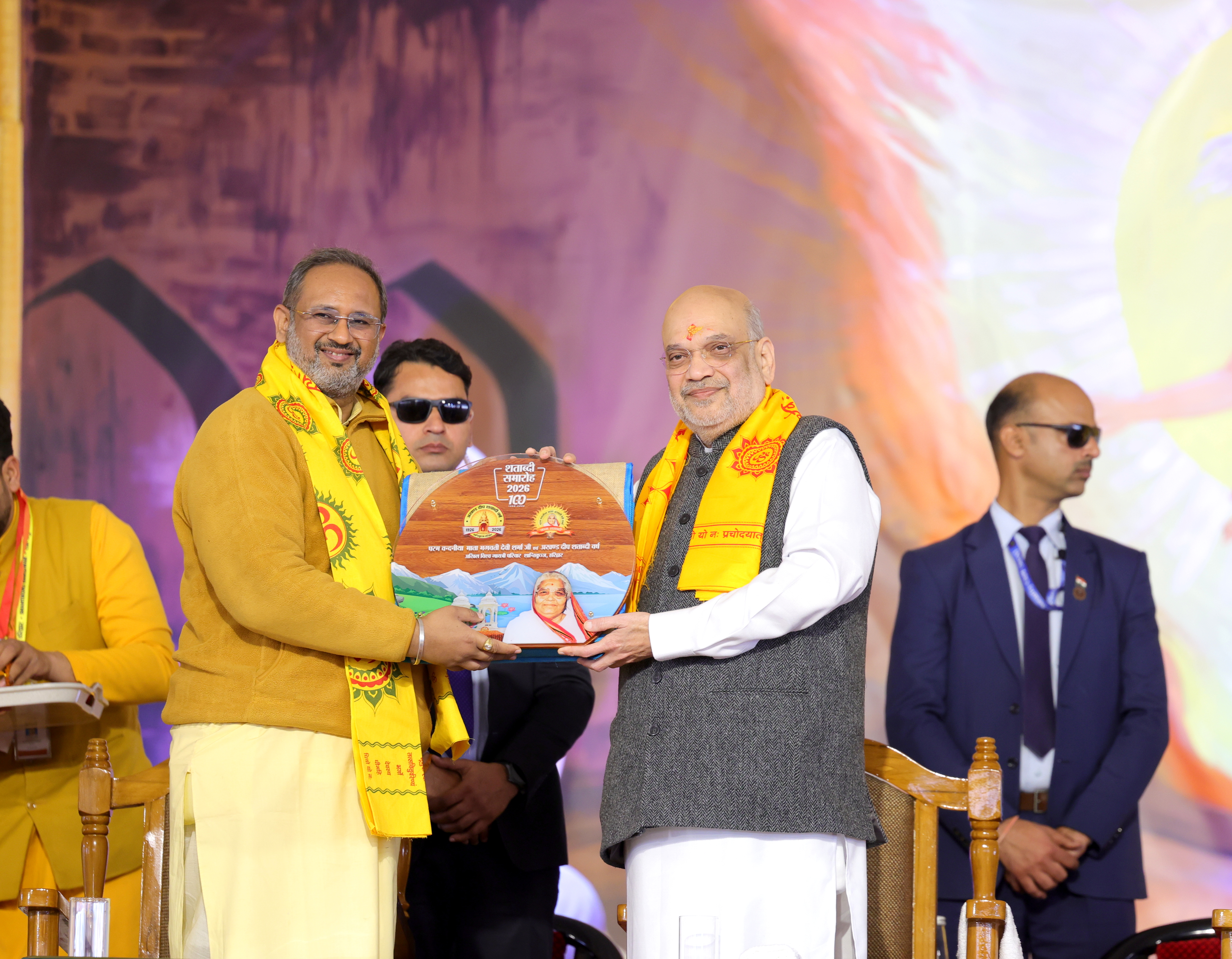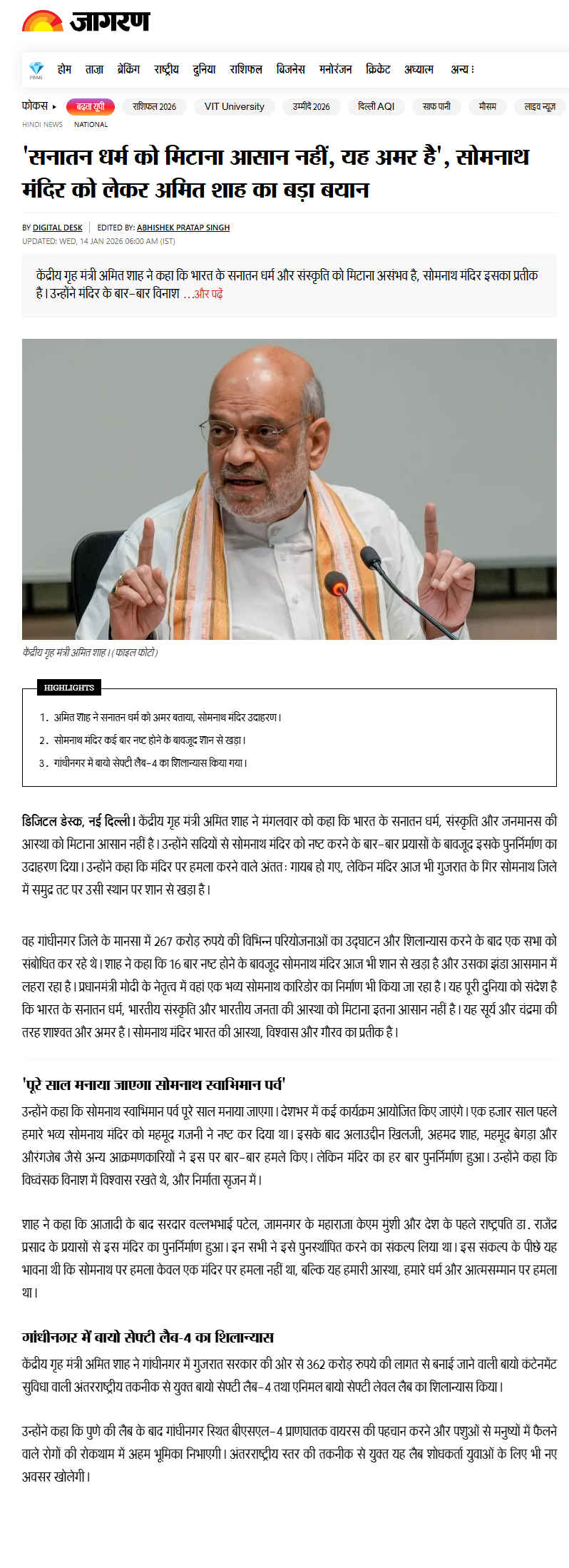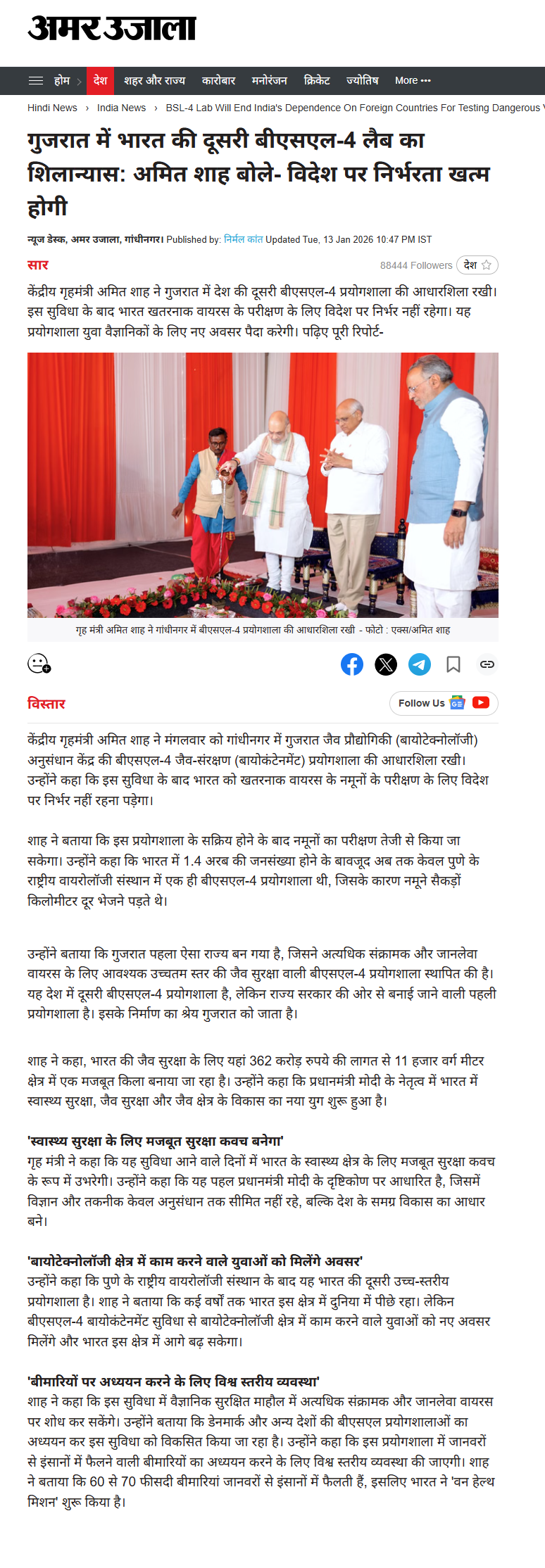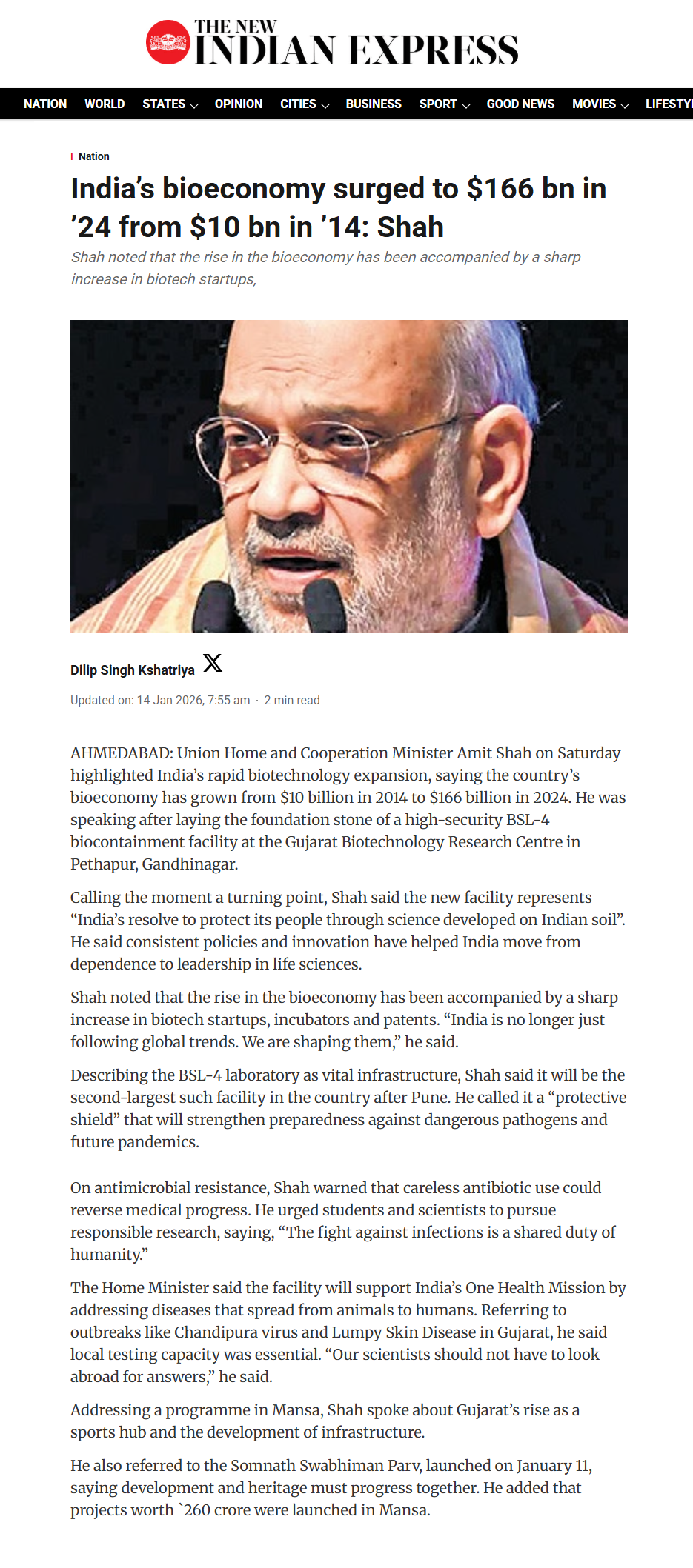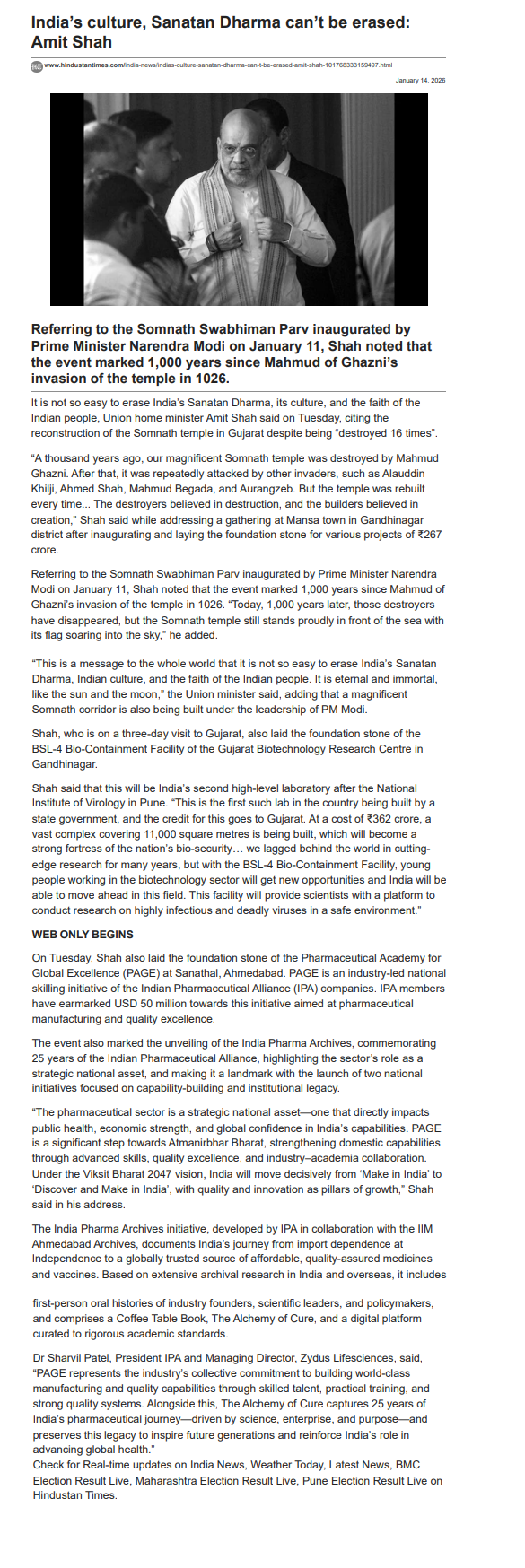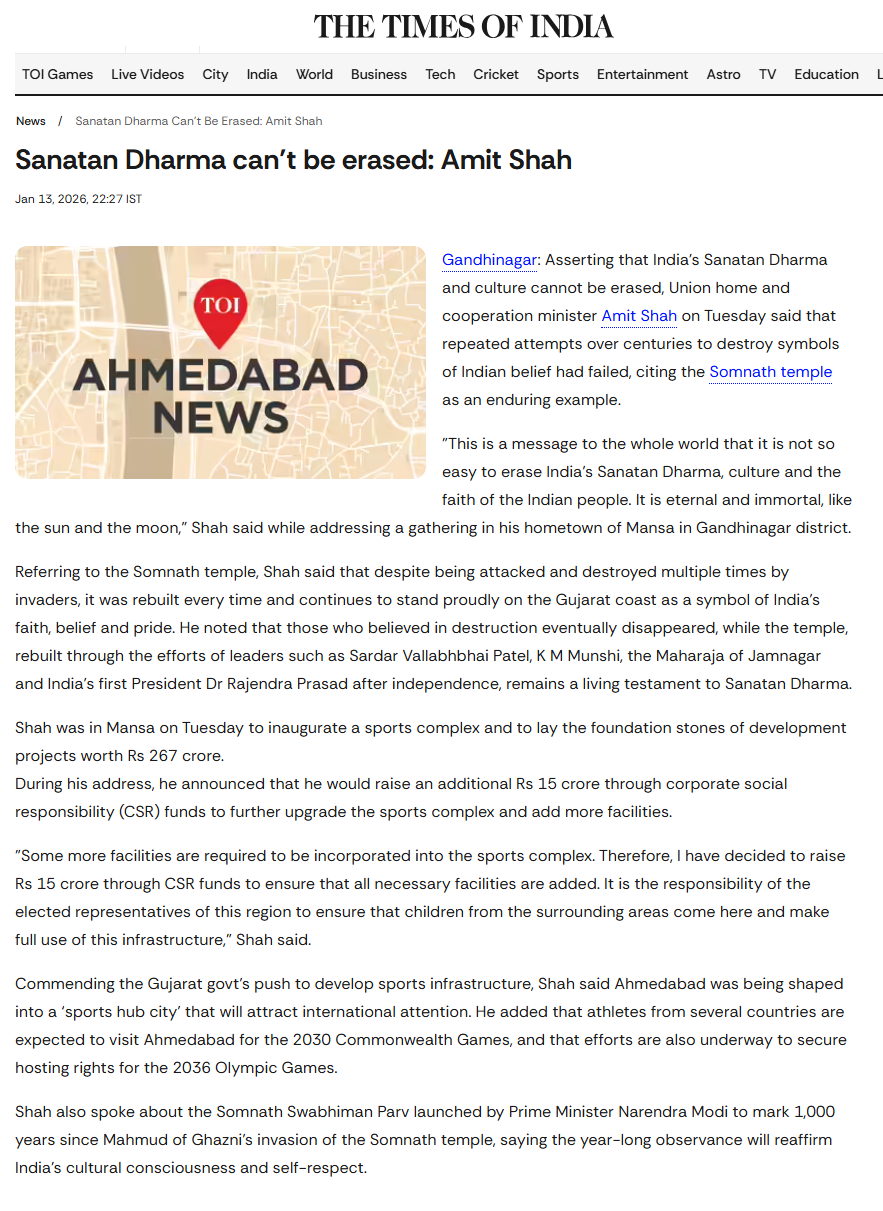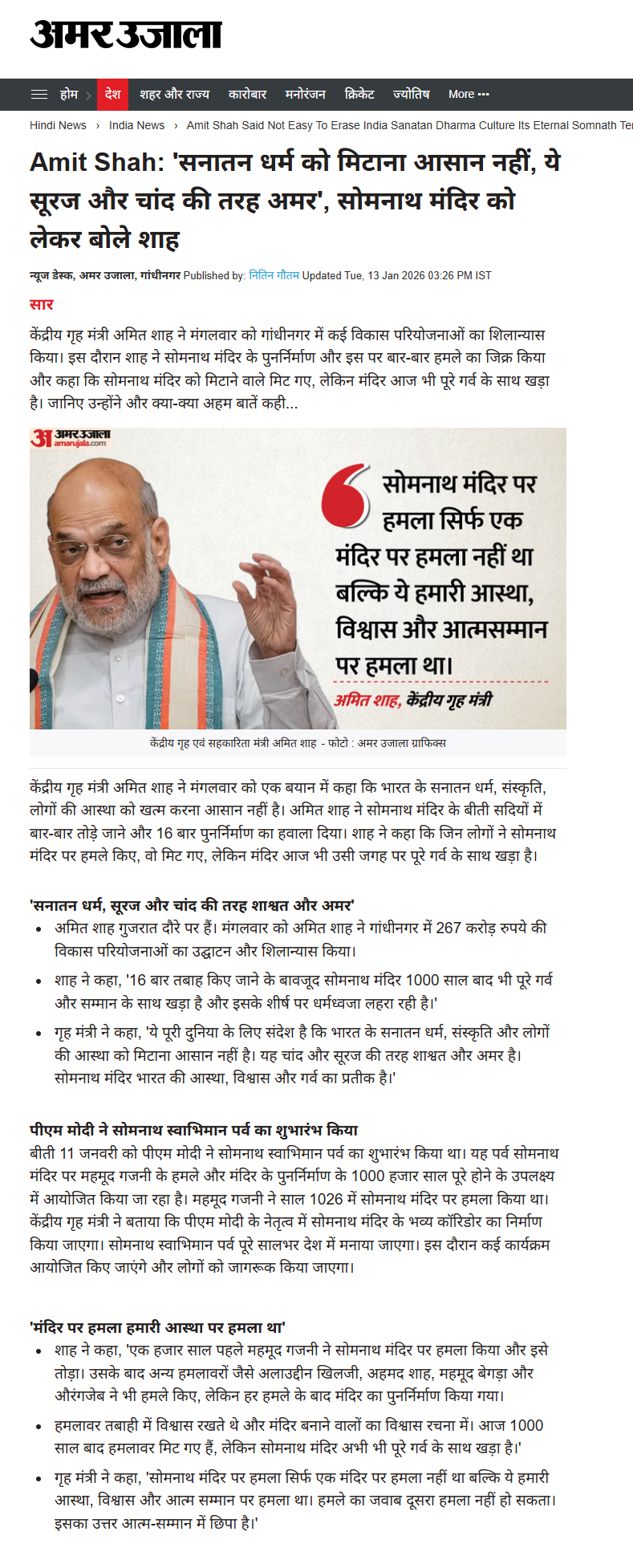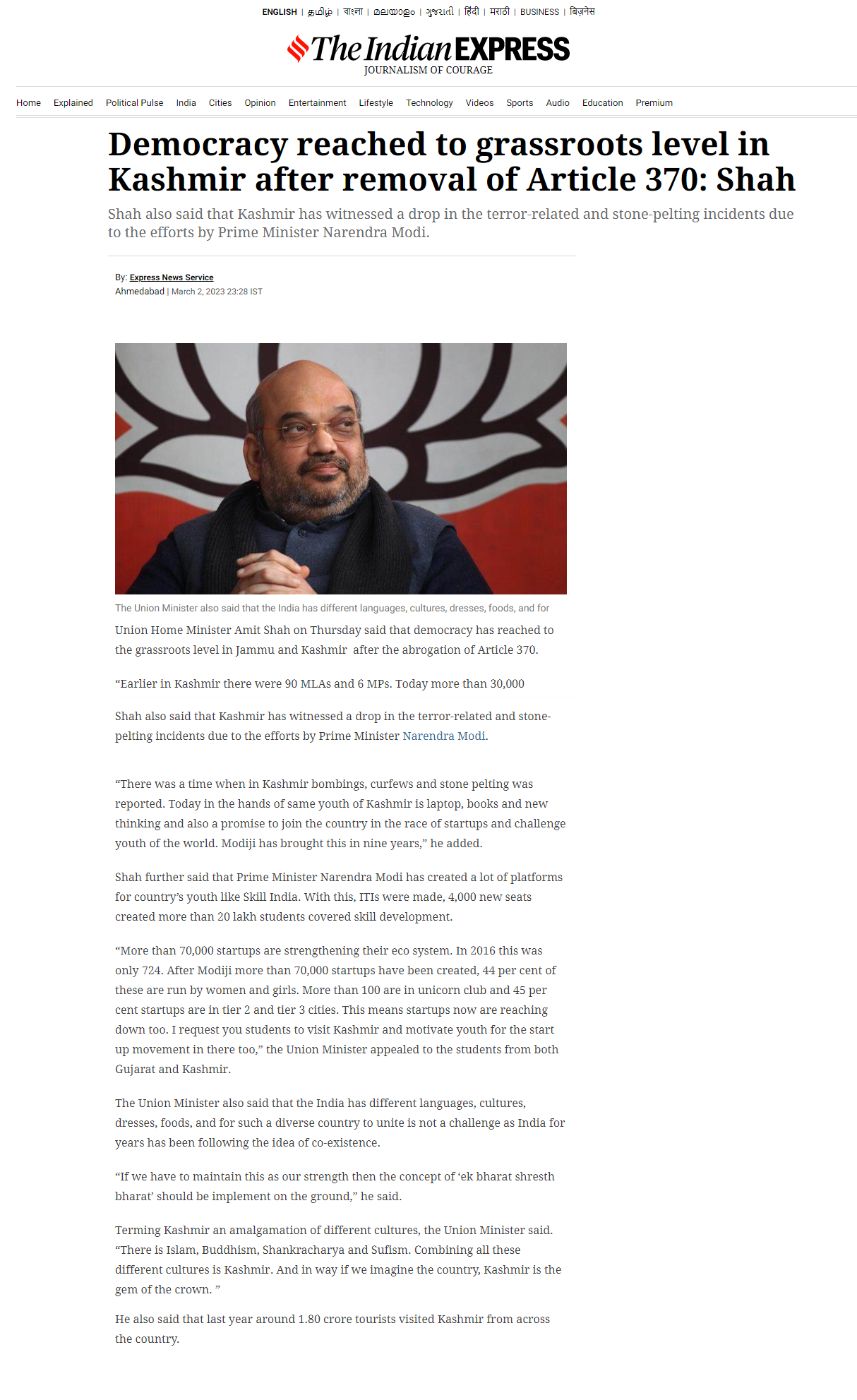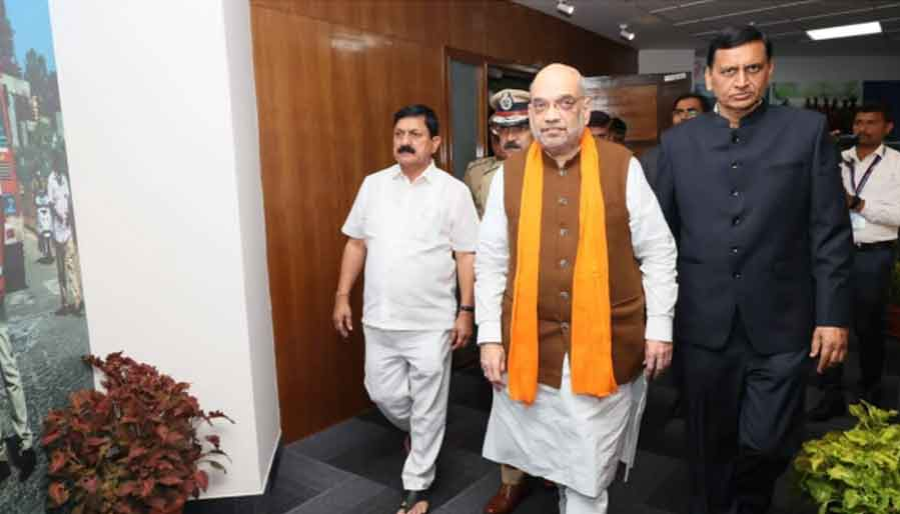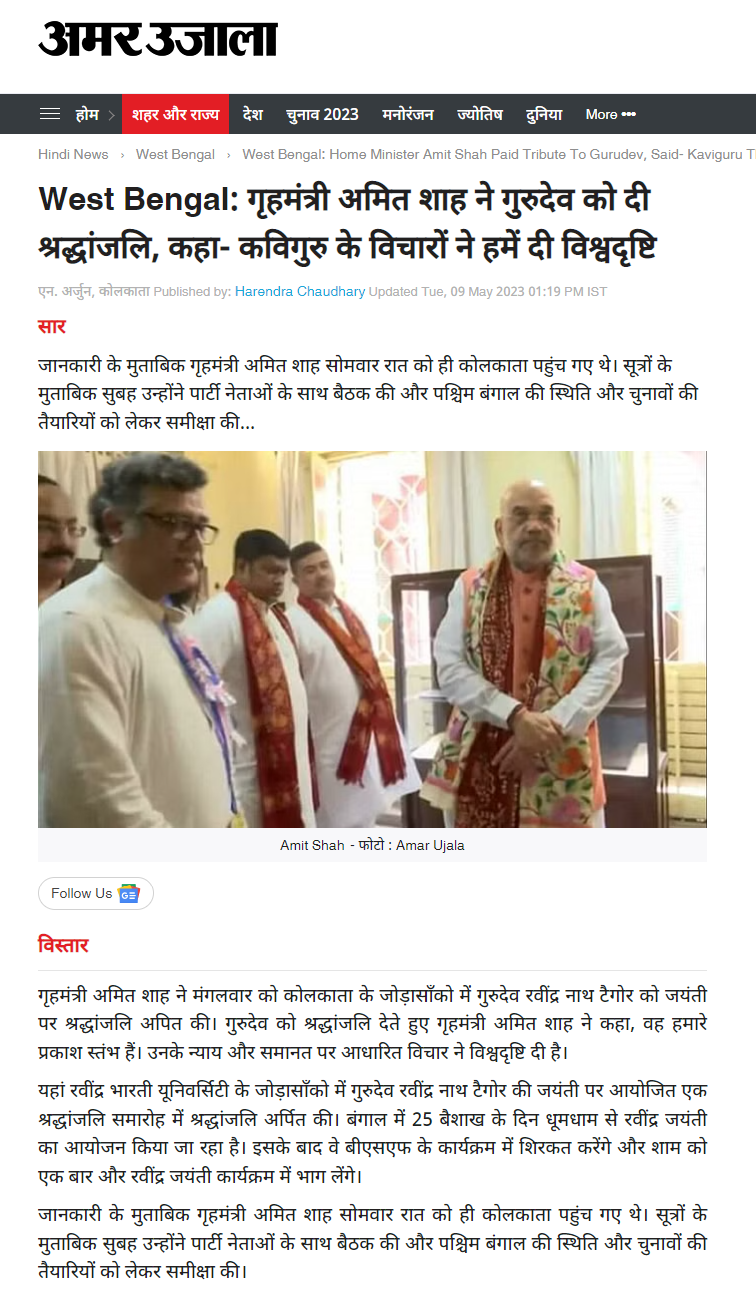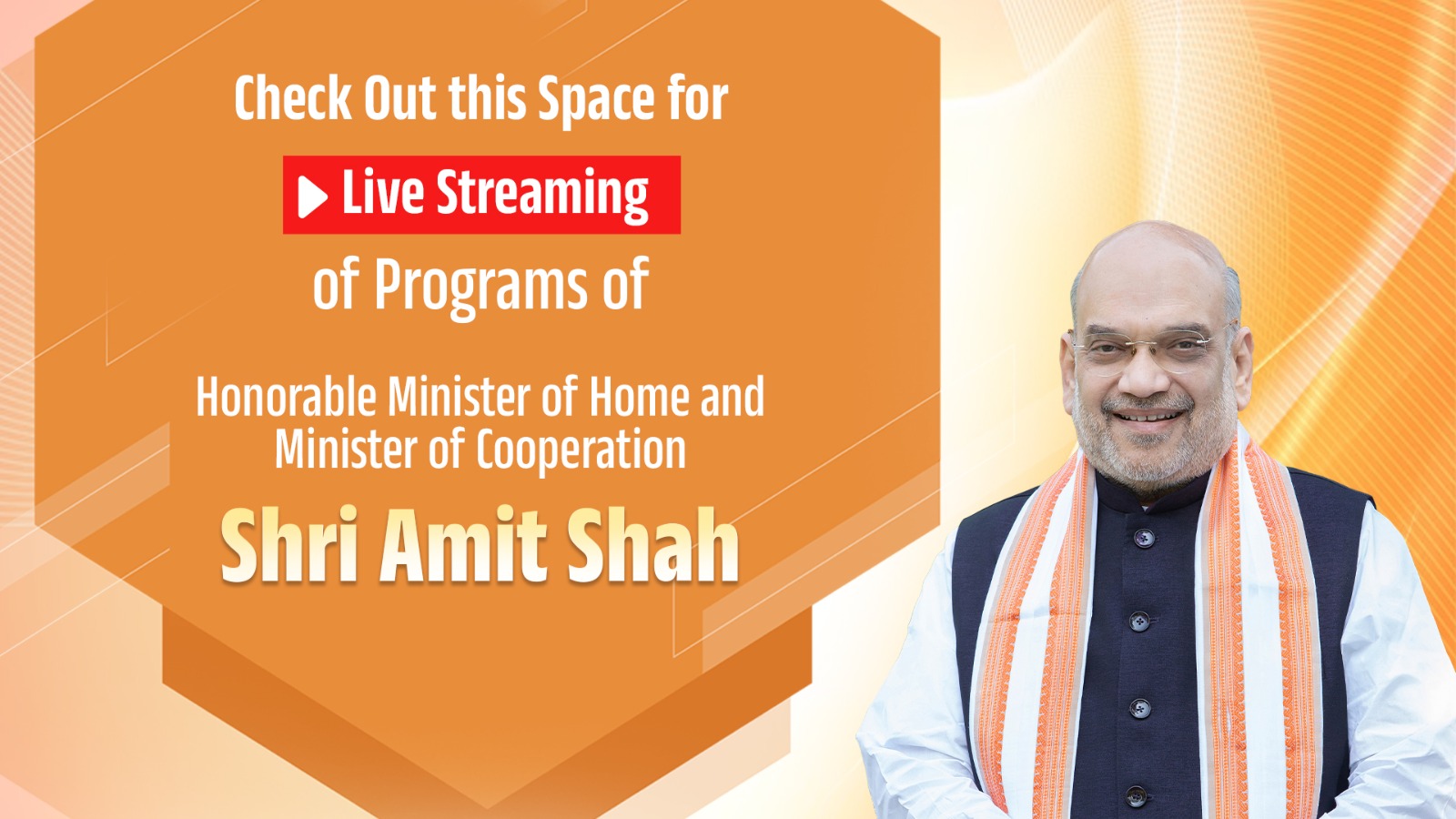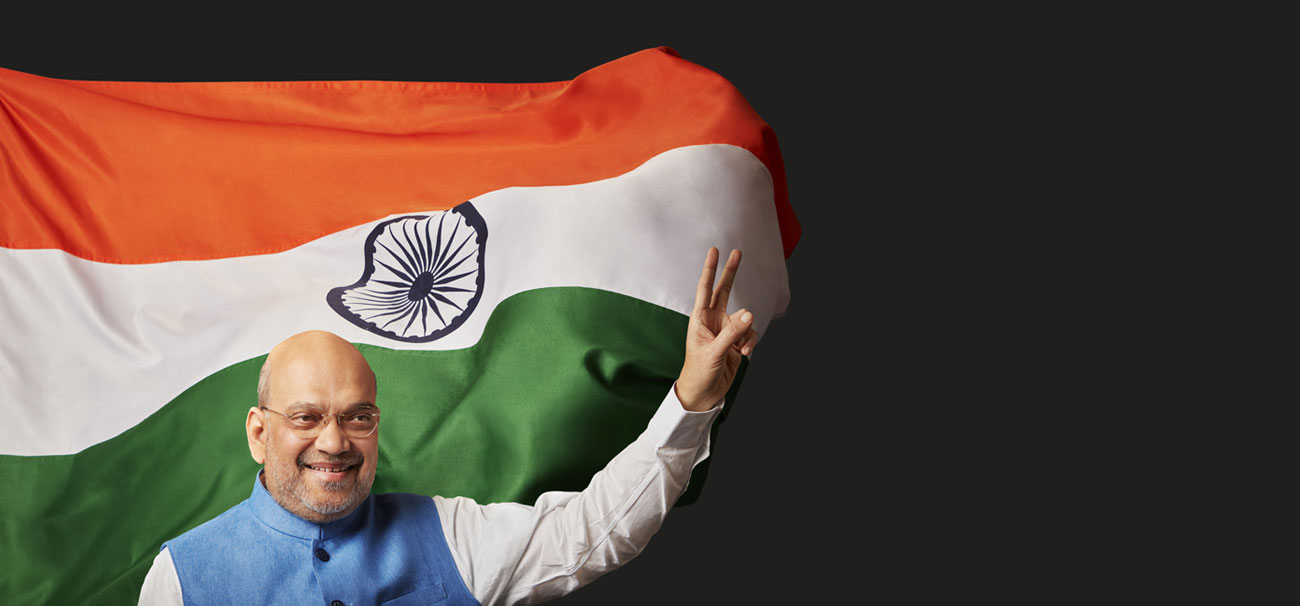
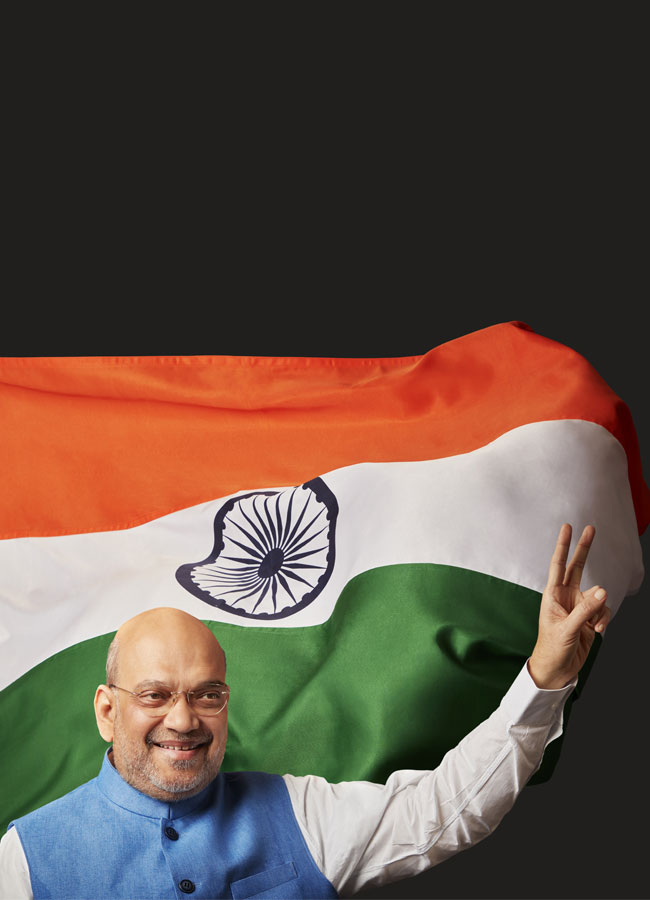
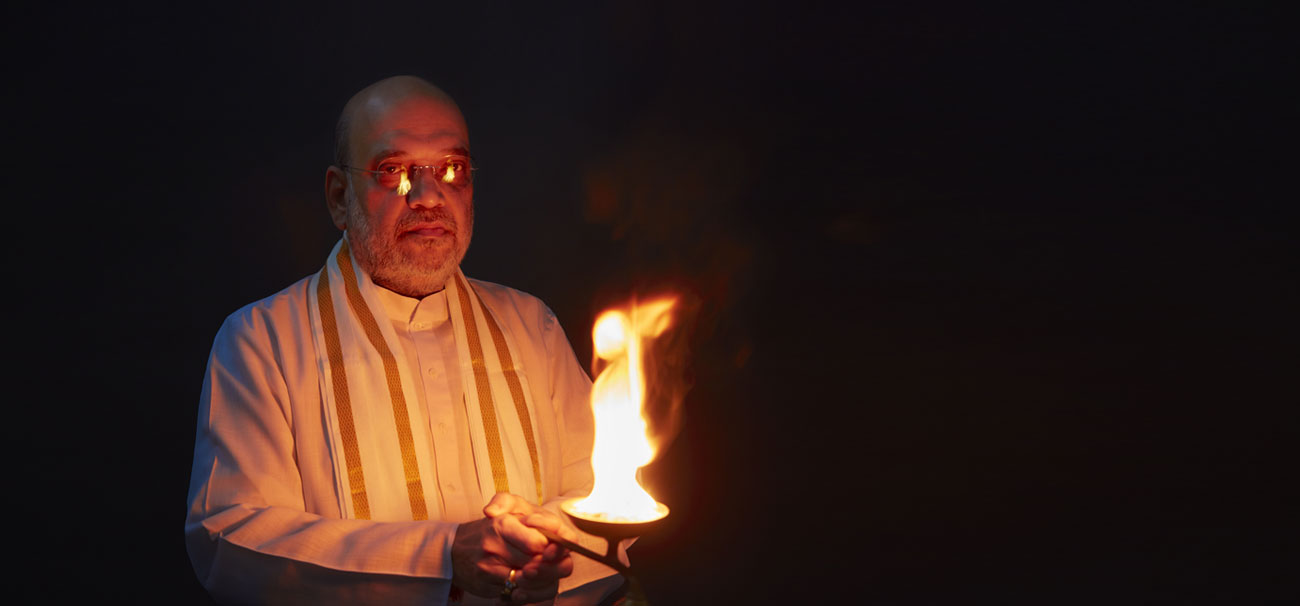
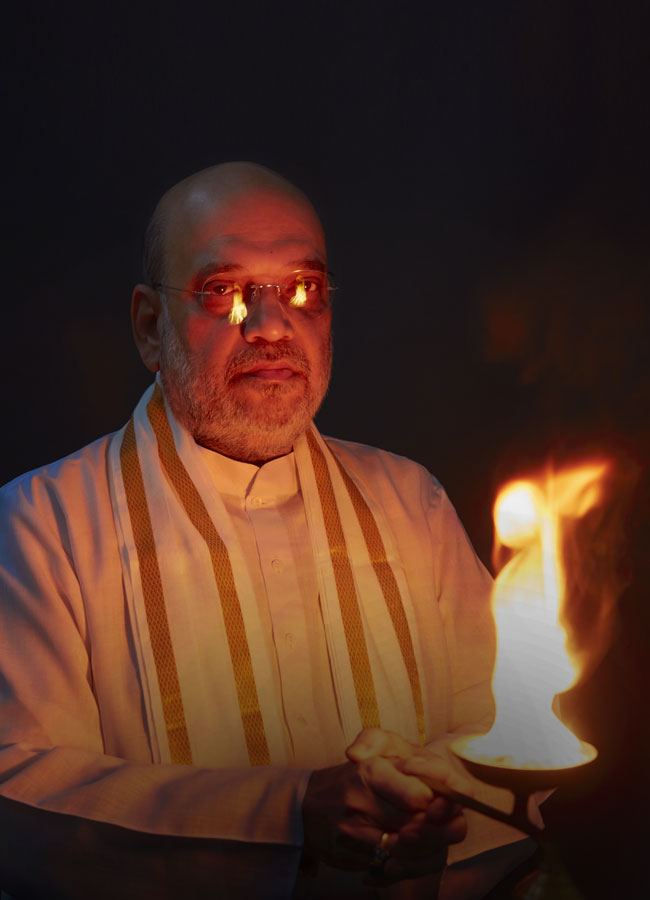


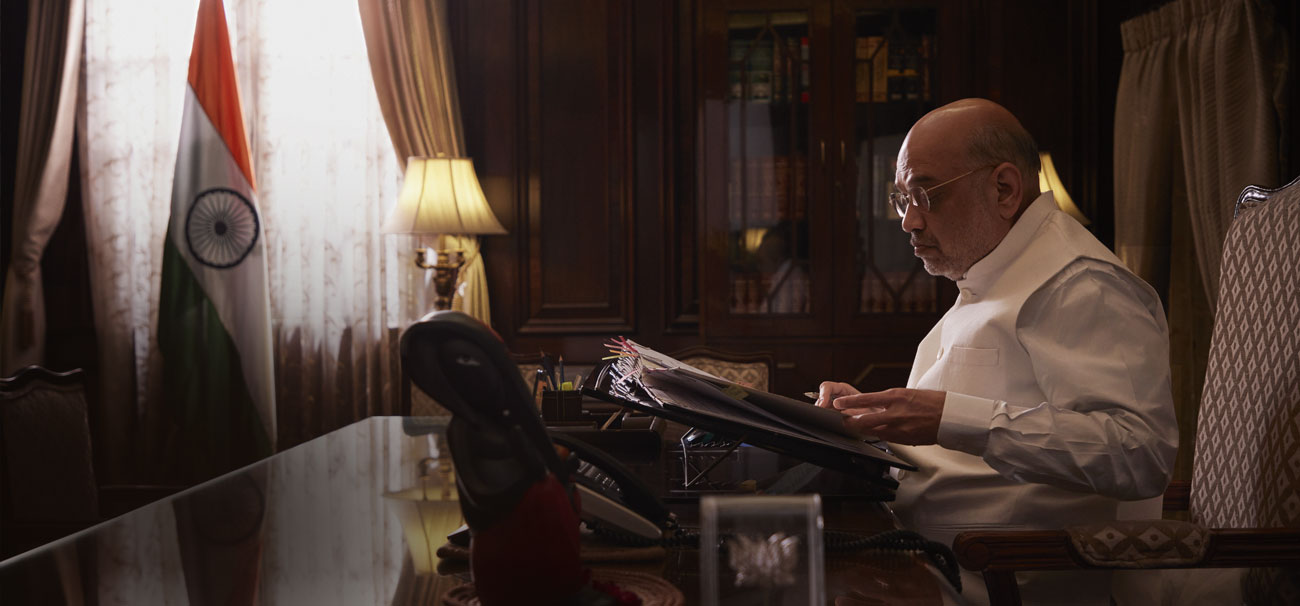
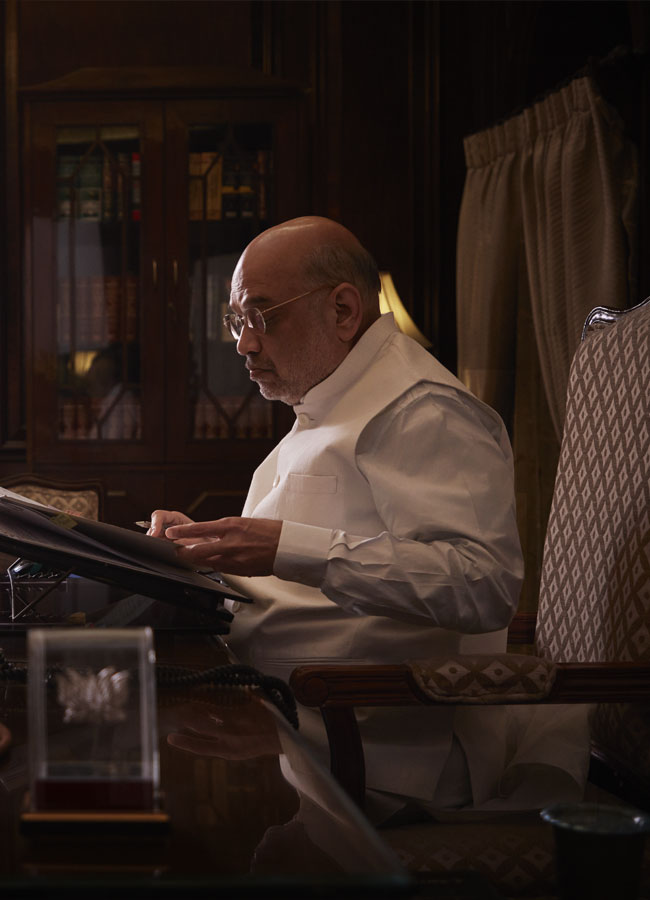
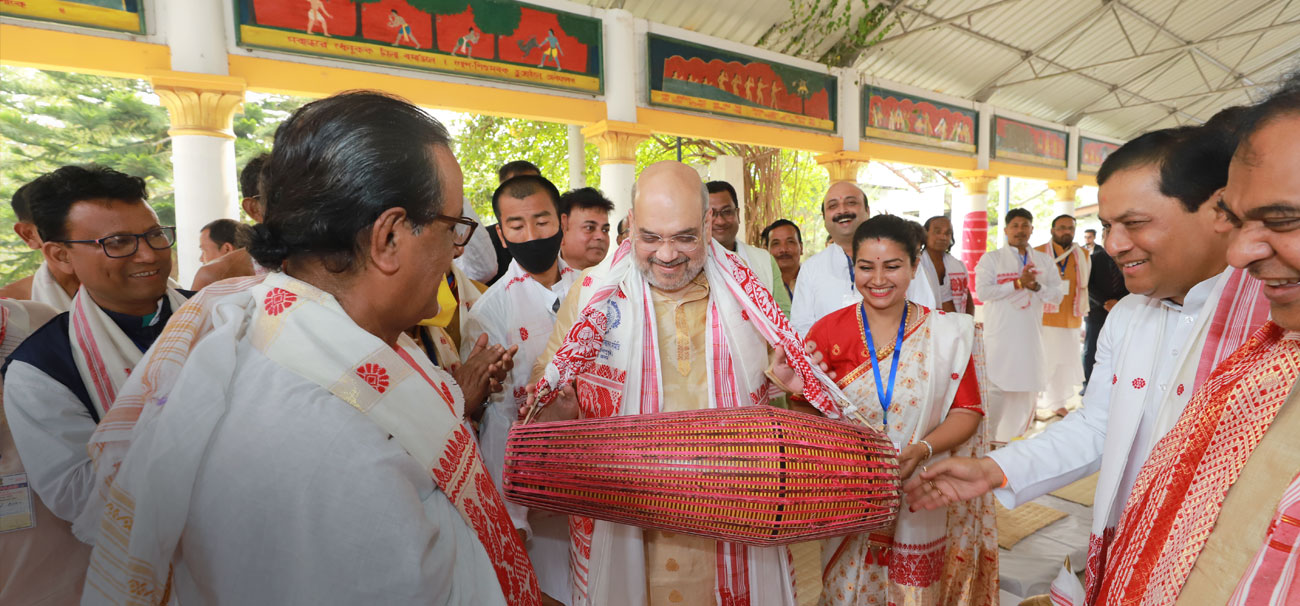
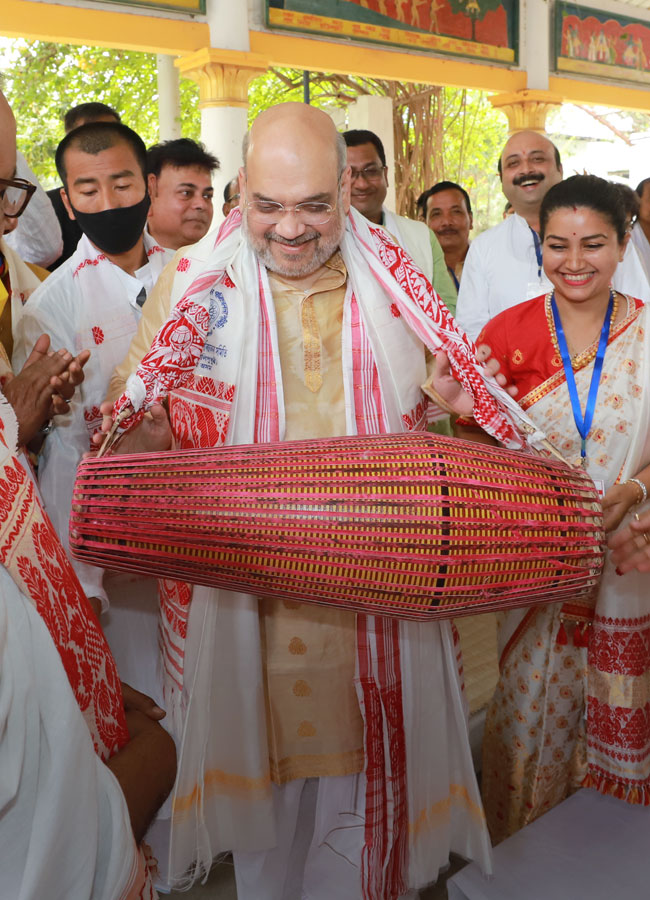
Journey from a polling booth worker to Union Home Minister
A sift through the pages of the BJP’s history may lead one to the fact that the party rewards its loyal and hardworking karyakartas. In Amit Shah who dedicated four decades of his life to its service, the BJP found one. His meteoric rise from being a booth karyakarta in the arid plains of Gujarat to the highest echelons of power as the Union Minister of Home - is a gripping tale in itself. It is a tale of willing sacrifice and tireless service for the party and its ideology.
His journey on the path of service began quite early at the age of 13. It was 1977, a year in which India’s politics was going through a ferment and turmoil. A new powerful anti-Congress sentiment was building up. During these turbulent times, the young Amit Shah was seen running from one lane to another putting up posters and stickers of Maniben Patel, a Jan Sangh candidate and daughter of Sardar Vallabh Bhai Patel. Quick to spot the fire within him the RSS took him under its wings. It was in the RSS, Amit Shah met his mentor, Shri Narendra Modi, an ascetic volunteer of the Sangh who too had chosen the thorn-ridden path of selfless service to nation-building, long before he did.
By that time, the Ram Janambhoomi Movement picked momentum in Gujarat. As the in-charge of Ahmedabad city in Gujarat of the fledgling party, he mobilized a sea of crowds in support of the Ekta Yatra and ensuing movement. In the aftermath of the movement, Amit Shah was asked by the party to manage the election campaign for BJP leader Shri L.K. Advani from the Ahmedabad constituency, a responsibility he shouldered till 2009. He also was the election manager of the former Prime Minister Atal Bihari Vajpayee when he contested from the Gandhinagar constituency.
On account of his unwavering commitment to the party and an unceasing spirit to work for it, Amit Shah’s career graph soared through the ranks like Secretary of the Ahmedabad City BJP, National Treasurer of the Bharatiya Janata Yuva Morcha, and Gujarat state secretary of the BJP. In 1999, he was made the State Vice-President of the Gujarat BJP.
Shri Shah also walked on the parallel trail of electoral politics. He won one after another election as an MLA from 1997 to 2017. In 2017, he was elected as a member of the Rajya Sabha from Gujarat and in 2019 to the Lok Sabha from the Gandhinagar constituency of his home state.
Under the guidance of the then Chief Minister Narendra Modi, an ace administrator Amit Shah left an indelible mark as a minister of Home, Transport, Prohibition, Parliamentary Affairs, Law, and Excise.
A versatile change-maker Amit Shah also engineered the revival of two moribund cooperative banks. During his chairmanship, the profits of the Gujarat State Financial Corporation rose 214%, and also successfully launched its IPO.
Paving his way to national politics a year before the 2014 Lok Sabha Polls, Amit Shah was chosen as the National General Secretary of the party and was made in-charge of Uttar Pradesh. With the Prime Ministerial candidate Narendra Modi’s soaring popularity among the masses and Shah’s deft handling of political affairs, the party won 73 out of 80 seats in the state contributing decisively to the BJP’s nationwide victory. In recognition of his contribution to the party’s victory in the 2014 Lok Sabha polls, he was made the Party’s National President in the same year. After he was re-elected to the same post in 2016, the magic of Prime Minister Narendra Modi and Amit Shah’s skills ensured another landslide victory for the party in the 2019 Lok Sabha polls.
An avid sports administrator Amit Shah helmed the Ahmedabad Central Board of Cricket Association, Gujarat State Cricket Association, and Gujarat Chess Association. With the advice of the then Chief Minister Narendra Modi, he also introduced chess in schools of Ahmedabad much to the benefit of the children.
On taking oath as the Union Minister of Home, Amit Shah brought about revolutionary changes in the way of functioning of the ministry and ensured peace and stability in Jammu and Kashmir, Northeast and leftwing extremism affected areas – three of the long-disturbed regions in India. In the first three years of his tenure, drug seizure and arrests of drug traders in India saw a manifold increase.
25 years as elected representatives serving people as MLA, MP-RS, MP-LS
Some political pundits say that leaders are born while others are of the view that they are created by the circumstances they find themselves in. But Amit Shah is a leader who has been hailed as one created by the masses themselves. And this is one of the reasons why he has never lost an election. Right from the initial days of his career as a candidate of the BJP, resounding victory has been his norm. Very often he throws a surprise by winning elections with a margin wider than those in previous ones.
An electrifying connection with the people and an uncanny ability to understand their problems are the factors that make him a person of the common folks. His connection with the masses is attributed to his focused approach toward his responsibilities as a public representative. Shri Shah created a lush green cover in his assembly constituency at a time when no one was talking about environment protection. Keeping an eye on even the smallest needs of the people he constructed a crematorium and an effective drainage system there.
Unsurprisingly, when Amit Shah is entrusted with the role of an election campaigner, it results in a groundswell of support; when he is given the role of a party leader, he establishes a close and lasting connection with its members creating a well-oiled election machinery.
His journey in electoral politics had a humble beginning as a booth manager in the Naranpura ward in Ahmedabad. However, in the year 1997, he bagged the first opportunity to take a flier on electoral politics himself. He was nominated as the BJP candidate for the Sarkhej Assembly segment bye-polls in Gujarat. He won with a margin of 24,689 votes. He won every subsequent election with a bigger number of votes. He expanded his winning margin up to 1,32,477 votes in his second election which was a five-fold increase from his maiden victory. He won his third and fourth terms with record margins of 288,327 and 232,823 votes respectively. After delimitation, his constituency was Naranpura. Even though the number of voters here was one-fourth of his previous constituency, he won with a margin of 63,235 votes. He created a record by winning the Gandhinagar constituency in the 2019 Lok Sabha polls with a margin of 5.57 lakh votes.
Eight years as Minister in Gujarat Government & Exemplary work as Union Minister for Home and Cooperation
If there is any word that aptly describes Amit Shah’s political persona then it is- Disruptor. His counter-intuitive ways of taking on the might of the problems give him this credit.
To ensure peace and stability in Kashmir he chose the path of abrogating Article 370 under the guidance of Prime Minister Narendra Modi. Similarly, a series of peace accords with the insurgent groups were struck in the Northeast.
The upshot was, Jammu and Kashmir showed a 32% decrease in terror incidents, a 14% decrease in the death of civilians, a 52% decrease in the death of security personnel, and a 14% decrease in terrorist recruitments in the very first three years of his tenure as the Home Minister. In the first three years of his tenure, Northeast India has seen a 68% decrease in terror incidents, a 60% decrease in the death of security personnel, and an 83% decrease in the death of civilians.
A comparative analysis of data from three years of Amit Shah’s tenure as the Home Minister and that from the Congress regime showed that in the period of 2009 to 2012, during the Congress rule, the total quantity of drugs seized by the agencies was only 13,54,546 Kgs and they valued at Rs.14018 crores. However, due to the introduction of cutting-edge technology and immaculate professionalism in narco-investigations under the guidance of Prime Minister Narendra Modi, the same numbers shot up to 39,08783 Kgs and Rs.61125 crores in the period of first three years of Amit Shah as the Home Minister.
Amit Shah’s role as the Union Minister of Home Affairs has primarily remained dedicated to creating a bulwark of security for the common man. Under the leadership of Prime Minister Narendra Modi, his deft handling of tricky situations resulted in a drastic dip in Left Wing Extremism. He is credited with the feat of ending the insurgency in Tripura without spending a single bullet while ushering in peace in the Bodoland area without disturbing the geographical integrity of Assam. He also ensured the settling of Bru-Reang refugees and thus put an end to one of the threats to India’s internal security.
He assumed charge of the Ministry of Cooperation in 2021, the same year in which it was created. Soon after taking charge, with the call of “Sahakar se Samriddhi” made by Prime Minister Narendra Modi, major policy decisions to enable a structured evolution of the sector to a glitzy corporate one were rolled out. Now the cooperative sugar mills have been exempted from paying additional income tax if they have to pay additional cane prices to the farmers as Fair Remunerative Prices or State Advice Prices. The individual housing loan limit for urban cooperative banks has been doubled. The rural Co-operative Banks are now permitted to lend to Commercial Real Estate - Residential Sector. Even Urban cooperative banks have been allowed to provide doorstep banking to their customers at par with commercial banks. Under the new regime, non-scheduled urban co-operative banks (NSUCBs), state co-operative banks, and district central co-operative banks are member lending institutions (MLIs) under a scheme that provides a guarantee for the collateral-free loans given to micro and small enterprises.
As the Home Minister of Gujarat, Amit Shah under the guidance of the then Chief Minister Narendra Modi had the responsibility of the security of the state. Shah built the world’s first forensic university during his tenure and strengthened international border security by introducing coastal police. In addition to it, he took several initiatives to strengthen law & order and to modernize the police. As a recognition of his skills as the home minister, National Crime Records Bureau declared Gujarat as the most peaceful state in terms of labor and industrial sector.
Shri Shah’s life journey is replete with examples of his innovative approach to issues, lateral thinking to solve the same, and futuristic planning to avoid recurrence. His stint as a Lok Sabha member is no exception.
Be it the construction of an array of five world-class stadiums to nurture sports talent or connecting the ponds with a water reservoir to ensure optimum usage of natural resources- the markers of his unique working style are now seen in the socio-economic and the cultural life of his constituency Gandhinagar.
His futuristic approach to social transformation can be sensed in the scheme launched by him to distribute nutritious food supplements to pregnant women to ensure the birth of healthy children. Toy banks created by him in his constituency for children from poor families and his introduction of the ‘Bhajan Mandali’ to distract youth and adolescents from the harmful means of entertainment, signify his counter-intuitive approach to identifying and solving socio-cultural problems.
It is a trademark working style of Amit Shah to walk far past his mandate as a public representative to serve the people, an approach evident in his schemes like free food to the attendants in the hospitals and special bank accounts to ensure a better future for the girl child.
A Firm Believer in Indian Culture & Ethos
Amit Shah was not sent to a regular school by his parents. Rather he received his early education in 'Indian Value Tradition' under the supervision of prominent scholars of the Gaikwad State. He was taught Indian scriptures, historical texts, grammar, and epics in his childhood. His early exposure to the Indian value system, not only instilled deep faith in Indian culture in him but also helped him establish a permanent connection with the masses. He grew up as a person inclined towards philosophy and spirituality, who even today immerses himself in books on Indian culture, philosophy, and mythology. His love for reading is well reflected in his initiative to begin a library movement to promote the reading of books on Indian thought in the BJP, when he was the party, President.
His experience in the RSS only cemented his belief in Indian culture which manifests itself in his endeavors to promote Indian languages and cultural nationalism across ranks and files of the party. Even as he shares the dais as one of the trustees of the Somnath temple trust, with Prime Minister Narendra Modi and BJP veteran L.K Advani, he also promotes the philosophy of Antyodaya in the party and among the masses. Shah firmly believes that successive governments in independent India failed to recognize and use the inner strengths of India’s very own traditional knowledge and ethos for the country’s development. But since 2014 under the leadership of PM Modi, gradually India is being brought on the right track and that is the reason we are well on the path to becoming great again.
During his tours, Shah always visits temples, cultural symbols, and places connected with historical personalities. Shah regularly speaks at events honoring and commemorating great Indian personalities. His scholarly and well-documented speeches on Adi Shankaracharya, Chanakya, Chhatrapati Shivaji Maharaj, Veer Savarkar, Dr. Syama Prasad Mookerjee, Pt. Deendayal Upadhyaya, etc mark his knowledge and also his commitment to the principles upheld by these great personalities.
Making BJP world’s largest party and building an invincible election machine
At 49, Shah was the youngest National President of the BJP. Under the able leadership of PM Modi, Shah is credited with the feat of giving a true pan-Indian face to the BJP not only in terms of organizational expansion but also taking the party’s electoral footprint to new territories. In a bid to achieve this feat, he took the pains to travel 10,23,867 kilometers across the nation.
He led the BJP to become the biggest party in the world by increasing its member count from 2.47 crores to 11.2 crores. Working with the principle of “Karya Sanskriti Wahi Karya Paddhati Nayi” (The same work culture but with a modern method), Shah took several initiatives to modernize the party. The three pillars of the BJP as an organization- Karyalay (office), Baithak (meetings), and Pravas (tour), were central to his organizational strategy. He pledged to build BJP offices in all the districts of India, pushed for regular meetings, and introduced innovative methods of tours. Shah also focused on reading by mandating libraries in all offices and holding regular programs at the booth level to strengthen the ideological moorings of the BJP karyakartas.
A prudent Shah understood that exposure to power may lead to the weakening of an organization, on account of the distance it tends to create between leaders and karyakartas. To prevent this from happening Shah designed “Vistrit Pravas (extensive tour)” and visited all the states in a short span of time. The focus of these intensive tours was to spread the party ideology, educate the karyakartas about the pro-people initiatives of the Modi government and strengthen the party structure at the grassroots. The BJP’s national president sharing the dais with the presidents of the state, district, and booth chapters of the party was the hallmark of this tour. This move of breaking the traditional barriers of the party hierarchy, that perhaps happened for the first time on the floor of a political outfit in independent India, - awed political observers of all hues.
In Gujarat Shah always played an important role in consecutive electoral victories of the BJP under the leadership of the then Chief Minister Narendra Modi. However, on the national scenario, he emerged as a master election strategist during the 2014 Lok Sabha election when he spearheaded the BJP’s revival leading to the party’s historic performance in Uttar Pradesh. NDA won 73 out of 80 Lok Sabha seats and increased its vote share from 15% to 42%.
After taking over as the national president of the BJP immediately after the 2014 general election, Shah used the growing popularity of Prime Minister Modi not only to electorally strengthen the BJP in its traditional territories but also to expand its electoral footprint in new territories. During Shah’s tenure, BJP for the first time got its chief ministers in Haryana, Tripura, Assam, Maharashtra, and Manipur and seated a deputy chief minister in Jammu & Kashmir. BJP also became a part of the ruling alliances in Meghalaya, Nagaland, and Sikkim. Shah’s masterstrokes took Modi‘s charisma to the states like Odisha, West Bengal, and Telangana and the BJP became the main opposition party overnight opening doors for future expansion. After losses in the 2018 assembly election in Rajasthan, Madhya Pradesh, and Chhattisgarh, the BJP cadres were demoralized. On 11 January 2019, in the national council meeting of the BJP in Delhi, Shah compared the 2019 loksabha election with the “3rd battle of Panipat” and reminded the karyakartas that this election will be a battle of two ideologies. His war cry revived the enthusiasm of the karyakartas. BJP emerged with a bigger mandate by winning 303 seats in this election.
The core of Shah’s electoral strategy lies in strengthening polling booths, striking alliances, roping in influential leaders from other parties and most importantly taking PM Modi’s persona to the people. With the call of “mera booth sabse majboot (my booth strongest)”, Shah launched the “Vistarak Program” focused on creating a team of booth karyakartas through volunteers. He himself worked as a ‘Vistarak’ in the states of West Bengal, Odisha, Telangana, Lakshadweep, and Gujarat. Shah roped in smaller parties extending the NDA- and gave wider social and regional representation thus boosting electoral prospects. Shah also designed and implemented several party programs to popularize the good works of the Modi government.
Taking Cricket & Chess in Gujarat to greater hights
An avid chess player and a sports enthusiast, Amit Shah under the guidance of the then Chief Minister Narendra Modi got chess included in the school curriculum and also won a place in the Guinness Book of World Records and the Limca Book by organizing unique chess competitions. As a cricket administrator, Shah took several steps to improve sports infrastructure and secure the future of the players.
Important role in bringing cooperative moment at the centre stage of Gujrat Economy
Shah’s deep understanding of cooperative movement was recognized a long ago when he was the national coordinator of BJP’s cooperative cell in 2001. Prior to his emergence, the Congress party dominated the cooperative politics of Gujarat. But Shah under the leadership of Modi turned it around and now the entire cooperative sector is in command of the BJP. He also is also credited with the revival of two dying banks –Ahmedabad District Cooperative Bank and Madhavpura Bank Ahmedabad. Now in a very short span of time as Union Cooperation Minister, Shah has brought the sector into the mainstream of national discourse by introducing several new schemes and piloting legislations in the parliament. It is his effort and the blessings of PM Modi that “Sahakar se Samriddhi” has become a buzz word in the economic planning and progress of India.
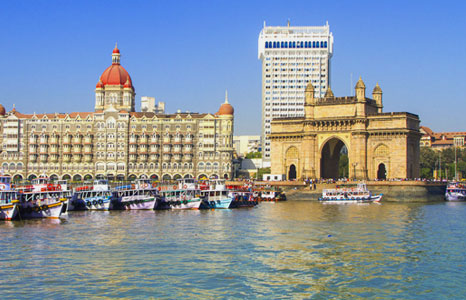
Amit Shah was born to Gujarati parents Mrs. Kusumben and Mr. Anilchandra Shah on October 22, 1964 in Mumbai. He completed 16 years of his schooling in his ancestral village in Mansa, Gujarat and moved to Ahmedabad with his family, thereafter. A patriot and an avid reader since childhood, Shah was inspired by the biographies of the great nationalists and aspired to serve his Motherland and contribute to the country’s progress.

Inspired by its ideology Shah joined Rashtriya Swayamsewak Sangh (RSS) as a Swayamsevak (volunteer) at the age of 16 years in 1980. Shah also started participating in organizational activities of Sangh’s student wing Akhil Bharatiya Vidhyarthi Parishad (ABVP).
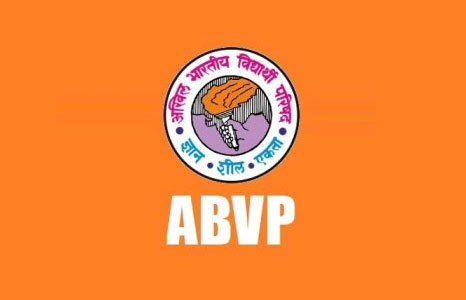
Because of his ideological commitment, organisational and oratory prowess, Shah was elevated to the post of the Joint Secretary of the Gujarat unit of Akhil Bharatiya Vidyarthi Parishad (ABVP) within two years of joining the organization.
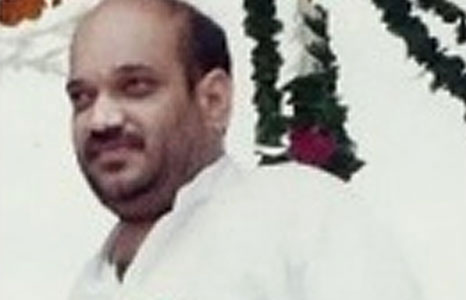
Amit Shah started his politics journey in 1987 when he joined BJP’s youth wing Bharatiya Janata Yuva Morcha (BJYM). He started playing an active role in various organizational programs of BJYM.
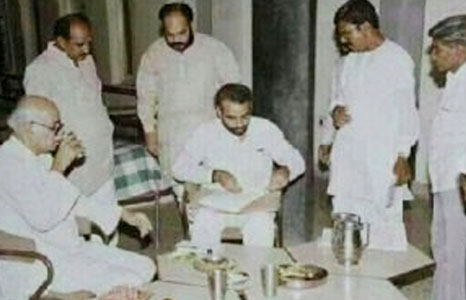
Shah was given the first organizational assignment when he was made the secretary of the BJP Ahmedabad city in 1989. This marked a significant milestone in his political journey.
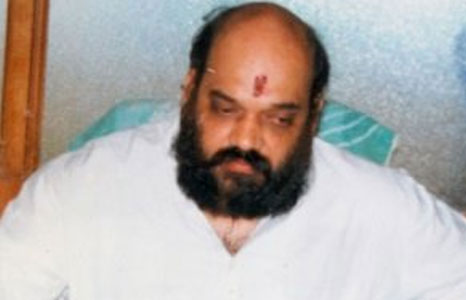
In 1995, Shah was appointed as the Chairman of Gujarat State Finance Corporation (GSFC). His achievements included:
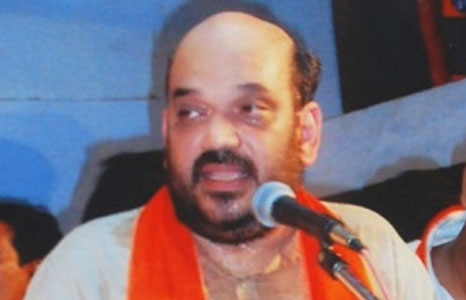
Amit Shah was appointment National Treasurer of the Bharatiya Janata Yuva Morcha (BJYM) in 1997.
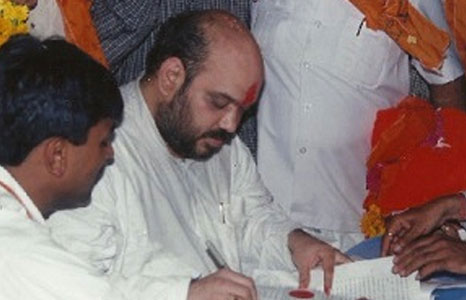
Amit Shah contested the assembly election from Gujarat's Sarkhej Legislative Assembly Constituency in 1997. He won by a huge margin and continued to do so in successive polls, increasing the winning margin every time. He continued to win this seat for four consecutive terms every time with a higher margin. He won the first election by a margin of 24,689 votes that rose more than 5 times to 132,477 votes in the next election. He won his third and fourth term with record margins 288,327(approx. 12 times) and 232,823 votes respectively.
After delimitation Shah's assembly constituency was Naranpura and, the number of voters in this constituency was only one-fourth of that in his previous assembly constituency. However, he still won the election by a huge margin of 63,235 votes. Despite being just an MLA with a meagre Rs.50 lakh as MLA grant, he mobilized thousands of crores from AUDA, The state government and other sources to ensure the development of his constituency.
‘People’s Person’: How MLA Amit Shah’s pioneering work struck a chord with the people
Before delimitation in 2008, Amit Shah’s assembly constituency was the second largest in the state composed of three talukas. With urban development, harnessing youth power, addressing local environment & health issues as his key priorities Shah introduced a series of measures which were strategized to accrue long-term benefits for the residents of the constituency. These included the following:
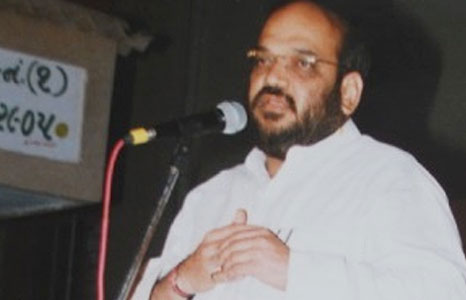
His organizational capacity was recognised by the top BJP leadership and at a relatively younger age of 34 years, Shah was appointed as the Secretary of the Gujarat unit of Bharatiya Janta Party in the year 1998.
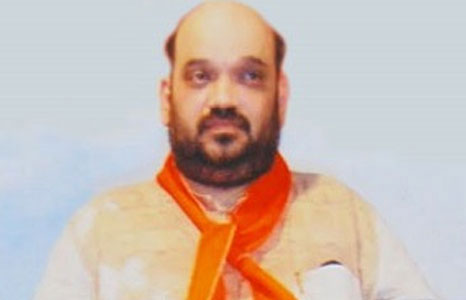
After a year, Shah was entrusted with the responsibility of Vice-President of the Gujarat unit of Bharatiya Janta Party in 1999.
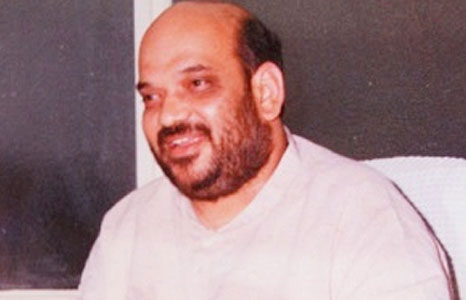
Amit Shah became the youngest Chairman of the Ahmedabad District Cooperative Bank (ADCB) at the age of 36 years. Within a span of just one year, he not only recovered the loss of Rs 20.28 crore but made the bank attain a profit of Rs 6.60 crore and also distributed a dividend of 10 percent.
Notable achievements as Chairman of ADCB
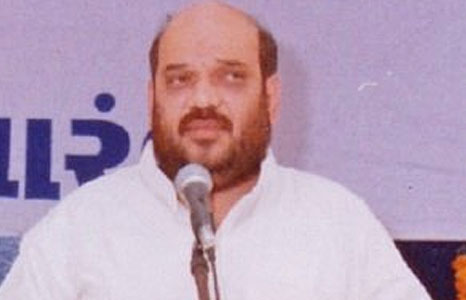
In 2001, Amit Shah was appointed as the National Coordinator of the Cooperative Wing of Bharatiya Janta Party. During this period, his impactful deliveries and proven track record, led his colleagues to adorn him with a new name ‘The Grandfather of the Cooperative Movement’ in his honor.
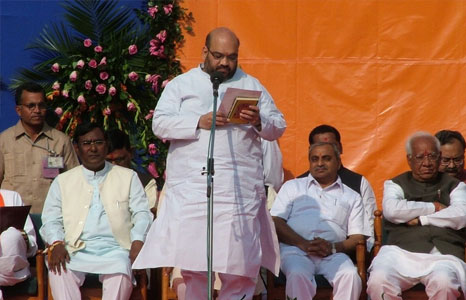
Amit Shah was sworn in as a minister in Gujarat Government for the first time in 2002 and was given charge of important departments like Home, Traffic, Prohibition, Parliamentary Affairs, Law and Excise. His accomplishments as the Gujarat Home Minister was much appreciated. During his tenure the state witnessed a significant drop in crime rates and no communal conflict was reported. While he took significant steps to modernize the state police, in the same vein he was also instrumental in establishing a state-of-the-art Forensic Laboratory. Notably, the world’s first Forensic Science University was started in Gujarat during his tenure. The traffic Branch of police to secure highways was reconstituted which significantly brought down road accidents and highway crimes. Gujarat’s progress in smart policing was praised by the National Crime Bureau, Govt. of India, when it declared Gujarat as the most peaceful state in the country with regard to labour, industrial and farm conflicts. Shah took up several such steps during his tenure as Home Minister under the guidance of then Gujarat CM Shri Narendra Modi, which paved a new path for policing in Gujarat and made the state a role model for other states.
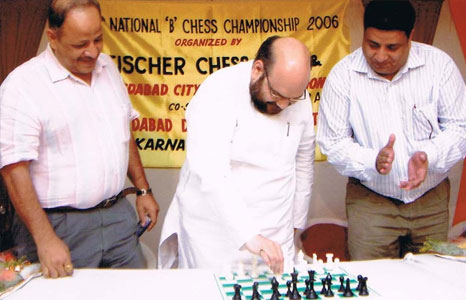
Himself an avid chess player, Amit Shah became the President of Gujarat Chess Association in 2006. It was during his tenure the national chess championship (National-B) was organized in Gujarat.
Significant Achievements
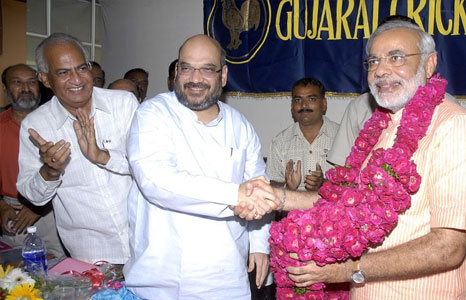
In 2009, Amit Shah was appointed as the President of the Ahmedabad Central Board of Cricket Association and the Vice-President of Gujarat State Cricket Association.
Key highlights of his tenure as Cricket Administrator
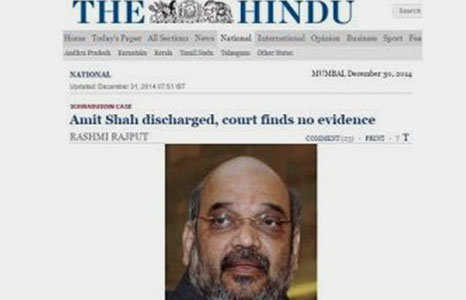
Mr. Amit Shah was sent to jail in 2010 in a fake encounter case concocted to fulfill political grudge He was acquitted from all charges by a special CBI court on the grounds that all accusations were politically motivated.
Entire Case was politically motivated
Under leadership of Gujarat Chief Minister Mr. Narendra Modi, Amit Shah successfully dented Congress party’s political prospects in the state by wiping it out at all levels. During his tenure as home minister of Gujarat, a dreaded terrorist Sohrabuddin Sheikh was gunned down by the state police, the Congress led UPA government at the centre, framed charges of fake encounter against Shah to avenge their political slide in Gujarat. During this period the country recorded 1200 encounter cases and Gujarat just 19. However, due to Congress’ intent of political vendetta, all the 19 cases of Gujarat and just one case from the remaining 1189 cases were selected for the inquiry. When he was granted bail after 90 days, the court observed that “There is no prima facie evidence against Amit Shah”. But despite getting bail, he was forced to stay out of Gujarat for two years. In 2015, a special CBI court finally acquitted Shah of all charges with a remark “entire case was politically motivated.”
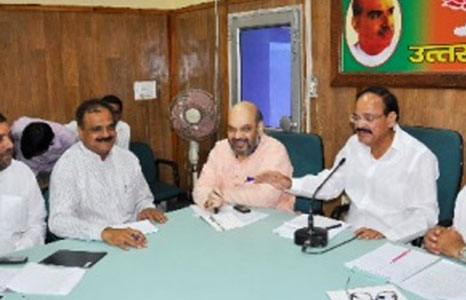
Recognizing the political acumen and efficiency of Shah, the BJP's national leadership made him the National General Secretary before the 2014 Lok Sabha elections and he was given the charge of the politically most significant state Uttar Pradesh which sends 80 MPs to the Loksabha. Under Shah’s stewardship, BJP won a record 73 of the 80 Lok Sabha seats in Uttar Pradesh.
Leading return of BJP in Uttar Pradesh
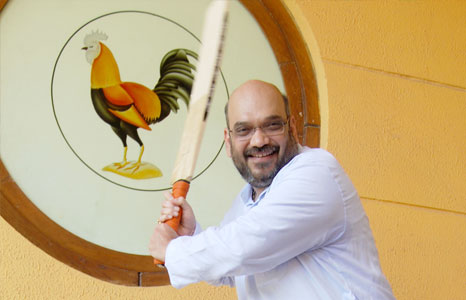
In 2014, after Shri Narendra Modi became the Prime Minister of India, Amit Shah was appointed the President of "Gujarat State Cricket Association." With his efforts GCA started rebuilding of "Motera Cricket Stadium" which is now known as “Narendra Modi Stadium” and is considered to be one of the best stadiums in the world.
Key highlights of accomplishments as President-GCA
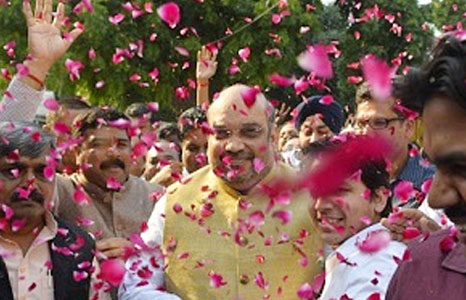
Acknowledging Amit Shah’s organizational capabilities and commitment towards the party's ideology, the senior party leaders appointed him as the BJP's National President in July 2014. At 49 years of age, Shah became the youngest National President, a record that remains unbeaten so far.
Some significant milestones include:
Shah’s tireless efforts and his unflinching commitment to party’s programmes and ideology got him the coveted post of National President in July, 2014. He got second term in 2016 and his entire term lasted till 2019. With political experience and training as a grassroots worker, he seamlessly discharged his duties.
Expanding electoral footprint of the BJP: Prior to 2014, BJP was considered to be a party of Hindi heartland and a few western states. But after 2014, due to the popularity of PM Modi and efforts of Shah, BJP not only further strengthened its hold in its traditional bastions but also expanded to the northeastern, and eastern states and also some parts of the southern states. BJP succeeded in having its CMs in northeastern states of Assam, Manipur, Tripura and Arunachal Pradesh; party also became part of ruling alliances in Nagaland, Meghalaya, Mizoram and Sikkim. North East Development Alliance (NEDA), a brainchild of Shah, played an important role in political growth of BJP in the north east. In eastern India, BJP formed its government in Jharkhand in 2014, NDA returned to power in Bihar and BJP emerged as the main opposition party in Odisha and West Bengal after its historical success in 2019 Loksabha Elections. Despite forming government in Karnataka and winning four Loksabha seats in Telangana, BJP still has to go a long way in the south, though party has increased its voter base in all southern states. However, due to local factors, during Shah’s tenure the party lost assembly elections in Delhi, Rajasthan, Madhya Pradesh and Chhattisgarh. But party retuned with a bang in 2019 Lok Sabha election by winning 70 of total 72 Loksabha seats falling in these 4 states. Prime Minister Modi’s popularity was one of the main factors in all these electoral feats of the BJP between 2014 to 2019. However, Shah’s strategic acumen and organizational skills also played a very important role.
Re-establishing the tradition of ‘Pravas’ (touring): Shah re-established the tradition of Pravas (tours) in the BJP by introducing several new strategic initiatives. Touring was made more effective by introducing concepts like Chakriya Pravas and emphasis on overnight stays. Shah also introduced austerity measures by discouraging five-star culture and travel by chartered planes. Such measures to a large scale succeeded in bridging gaps between leaders and common workers. Shah promoted tour culture by setting example by himself, he became first BJP president to tour all states of India within first year of his tenure and during his tenure he spent at least one night in 90% district HQs of India.
Membership Drive: Shah introduced a transparent technology-based membership drive. Such was the effect of Shah and PM Modi’s popularity that in a short period of time BJP membership rose from 2.47 Cr. to 11.20 Cr. and it became the world’s largest party overtaking Communist Party of China. Thanks to Shah’s efforts today BJP boasts of more than 18 Cr. members. It is noteworthy that only seven countries in the world have bigger populations than the number of BJP members in India.
Training Drive: An extensive training drive was also launched to train newly inducted party members. The objective was to train them about party’s ideology and programs so that they could become active members of the party. Millions of workers were trained in thousands of training camps. Besides this Shah also organized training camps for office bearers and assistants of ministers.
Building offices down to district level: Shah took up ambitious project of building BJP office in every district HQ of the country. Thanks to Shah’s vision the BJP has either a fully furnished office or one in progress in every district today.
Promoting reading by building libraries: An avid himself reader, Shah made libraries an integral part of BJP offices. He also initiated a project to digitize all party documents.
Restructuring Party Organization: Before Shah took over, the BJP organization had dozens of departments and cells. Most of these departments and cells did not have a clear mandate and were dysfunctional. Shah dissolved all of them and scientifically carved out 19 departments and 10 projects with a clear mandate and objectives. He also ensured that this structure is followed in each state organization. He constituted a special team for implementation of this initiative.
Sampark (outreach) for Smarthan (support): BJP under Shah selected 4000 public representatives to reach out to Eminent personalities from different fields. The objective was to educate these opinion makers about good work done by the Modi government and seek their support for the party. Shah himself started this campaign on the 29th of May in 2018 and met formers Chief of Army Gen Dalbeer Suhag & constitution expert Mr. Subhash Kashyap. Shah met about two dozen eminent personalities under this drive.
Pt Deendayal Upadhyay Vistarak Yojana: Shah once said, “to win election one has to win polling booth”. Following this principle, Shah designed this project to strengthen the party at polling booth level. Party workers, who were given the responsibility to appoint booth teams and give them party programs, were designated as Booth Vistaraks. At national level, party appointed 400 thousand Vistaraks. Among them more than 4 thousand were full time Vistaraks (6 to 12 month engagement). Shah himself played the role of a Vistarak and visited 15 booths across five states, starting from Naxalbari of West Bengal.
All India Presidential Vistrit (Extensive) Paravas (Tour): At Bhubaneshwar Executive Meeting of the party in 2017, Shah announced All India Extensive Tour for himself. The purpose was to strengthen party organization and imbibe confidence in party workers. Under the program, Shah visited all states of India spending 3 days in big states, 2 days in medium states and 1 day in UTs and small states. Shah spent 60 days (46 days night stays) travelling more than 50 thousand kilometres. He held 309 organizational meetings and direct interactions with intellectuals, media and other social and economic organizations. During this drive history was made as for the first time National, State, District, Mandal and Booth Presidents of the BJP shared dais.
Strategy for Weak states: Shah devised a strategy to expand party footprint in seven weak states namely Andhra Pradesh, Assam, Kerala, Odisha, Tamilnadu, Telengana and West Bengal. Party leaders panned out in these states, programs were made for PM Modi and Shah himself extensively toured. The strategy worked, BJP formed its government in Assam and increased its Loksabha MP tally from 14 in 2014 to 41 in 2019 in these seven states.
Strategy for North East: PM Modi made the Northeast a special focus area in his programs due to the region's importance in national unity and its potential for development. Shah took it as an opportunity to expand the party to the region. Due to his relentless efforts, the North East Democratic Alliance (NEDA), an alliance of like-minded parties, was formed. Bolstered with the induction of strong local leaders, the BJP/NDA formed its government in all northeastern states including Sikkim. In 2019 the NEDA’s tally in the Lok Sabha swelled from 8 to 18
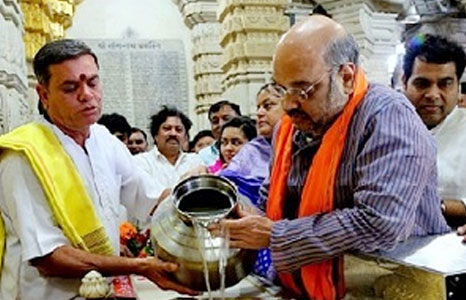
In the year 2016, Amit Shah was made the trustee of the Somnath Temple Trust. Aadi Jyothirlinga Shri Somnath Mahadev Temple is one of the 12 sacred Jyotirlingas, Prime Minister Mr. Narendra Modi and Mr. Lal Krishna Advani are also the trustees of this Trust.
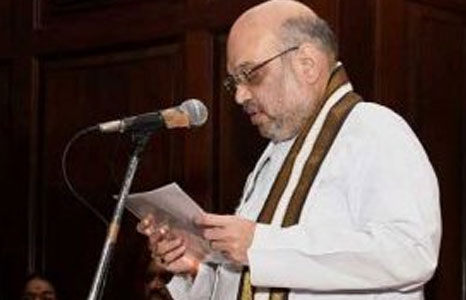
Shah did not contest 2017 Gujarat assembly election and after serving the people as MLA, he entered Indian parliament in 2017 as Member of Rajyasabha from Gujarat.

Being a people’s person, Shah chose to enter parliament by contesting Loksabha election from Gujarat’s prestigious Gandhinagar Loksabha seat in 2019. Former Prime Minister Atal Bihari Vajpayee and Deputy Prime Minister L.K. Adwani also contested in this seat several times in the past. Shah won by a record margin. He defeated his nearest rival of Congress party by a record margin of 5 lakh 57 thousand votes by securing 70 percent votes polled. He took oath as Loksabha member on 17th June 2019.

Took oath as Union Minister in Modi government on 30th May 2019
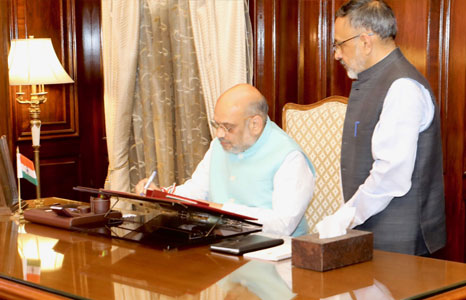
Assume Charge as Union Home Minister on 1st June 2019.
Achievements as Home Minister of India
As Home Minister in Gujarat, Amit Shah used to constantly draw attention to the subjects which were obstructing the security and sovereignty of the country. Today, when he is the Home Minister of the country, he is becoming an important participant in the serious steps taken on those aspects under the leadership of Shri Narendra Modi. During his tenure as the Home Minister, the Modi government at the Center has taken conciliatory decisions on many historical and decades-old issues related to making the country's internal security impenetrable. Though the work is in progress but some of the notable works done in the first three years are as following.
Abrogation of Article 370 & 35A: The path to peace and progress has been opened in the Kashmir Valley due to a permanent solution to a decades-old problem like Article 370. Path to abrogate Article 370 was not an easy one due to various legal hurdles & lack of required majority in the Rajya Sabha. Once again the Chanakya in Shah was at play, he not only navigated across legal hurdles but also managed to garner required support in the Parliament to achieve what had always appeared impossible. Shah made historic speech in the both houses of Parliament and was applauded by none other than Prime Minister Modi himself who gave him full support in implementing this landmark amendment. This historic decision has demoralized and weakened the designs of separatism and terrorism in Kashmir. Grassroots democracy has been reinstated in Kashmir by holding peaceful panchayat elections and now Kashmir valley is experiencing fruits of development like rest of India.
Citizenship Amendment Act (CAA): Besides Article 370, CAA has been part of the BJP's election manifestos for a long time. It was only Shah under PM Modi who not only had the resolve to legislate the CAA successfully but also the courage to do the same. Baffled opposition instigated demonstrations across the country but Shah did not budge and ensured that the CAA becomes a reality. This legislation has given hopes to millions of Indians who were facing unabated persecution on the basis of religion in other countries for decades. Thousand of people have already been given Indian citizenship under the CAA.
Return of peace and Progress in North East: After becoming the Home Minister, Amit Shah also peacefully resolved the pending problems related to the borders of the north-eastern states and internal security there. Vexed issues like Bru-Reang Pact, resolution of Assam-Meghalaya border dispute, resolution of Bodo problem are among few achievements worth mentioning.
Handling Left Wing Extremism & Terrorism: Shah made a concrete strategy on the policy of zero tolerance against left-wing extremism. Today, this menace has been pushed to the corner and is breathing its last. The newly attained readiness of the internal security system to tackle terrorism has reduced terrorist activities to mere sporadic incidents.
New approach to Disaster Management: After becoming the Home Minister, Shah prepared a complete blueprint to organize the new approach to disaster management according to the ten-point agenda set by PM Modi. His approach to disaster management covers all the crucial aspects related to management of calamities beginning from advanced planning to the re-habilitation of affected people. Now the people of India trust National Disaster Response Force and feel safe in the presence of the force even during calamities.
Giant Stride towards Drug Free India: Amit Shah, as the Home Minister, took several steps at the policy level to deal with the challenges of drug trade and drug consumption.
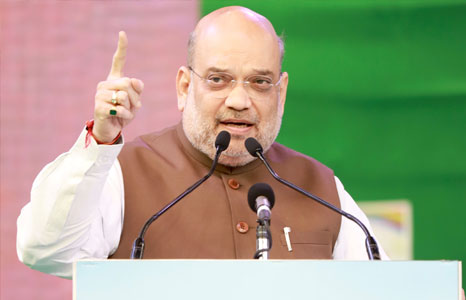
When Prime Minister Narendra Modi formed the Ministry of Cooperation on July 6, 2021, Amit Shah was given its charge. Shah's experience in the cooperative sector is wide and extensive. Under the guidance of PM Modi, Ministry of Cooperation is working with the pledge for “Sahakar Se Samriddhi” (Prosperity through Cooperation). Shah is working with the goal of positioning the cooperative movement for modern challenges while eliminating instability, creating a transparent system and restoring the confidence of the smallest farmer in the cooperative sector. Shah believes that a robust cooperative movement can become growth engine of India and immensely contribute to the country’s GDP.
In a revolutionary step, the Ministry has decided to computerize 63000 PACs across India to ensure maximum transparency and modernization. On the basis of recommendation of Cooperation Ministry, the Reserve Bank of India has decided to increase the housing loan limits of Cooperative Banks by double. In addition to this, now like corporate banks, cooperative banks are also providing door step service to its customers.

Shri Amit Shah scored an even bigger victory in the Lok Sabha Election 2024 than in 2019. This time, he defeated his nearest rival by a vast margin of 744,716 votes. Shri Shah bagged a massive 10,10,972 votes. He took the oath as Lok Sabha Member for the second time in 24 June 2024.

On June 9th, 2024, Shri Amit Shah took the oath as a minister in the Union Cabinet for the second time.

Shri Amit Shah reassumed his role as Union Home Minister for the second consecutive tenure on June 11, 2024.
Shri Shah embarked on his next journey as Union Cabinet Minister, bolstered by the success he attained in his previous tenure. In his first tenure, Shah was adorned by the achievements of abrogating Article 370, containing terrorism in Jammu and Kashmir, the Northeast, and left-wing extremist-affected areas. As the Home Minister, Shri Shah was also credited with the achievement of replacing colonial criminal laws with indigenous legislation, paving the way for comprehensive reform in the criminal justice system.

Shri Amit Shah reassumed his role as Minister of Cooperation for the second consecutive tenure on June 11, 2024.
As the Minister of Cooperation, Shri Shah was celebrated for the computerization of 63,000 PACS and for empowering cooperative banks by doubling their limits for providing housing loans. Now, even cooperative banks can provide door-to-door services.
